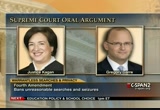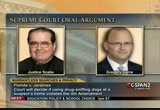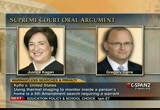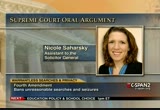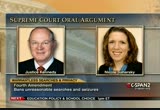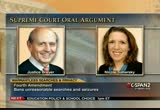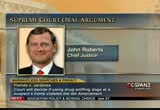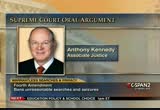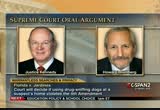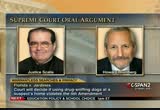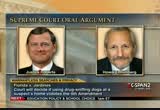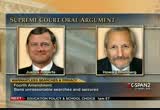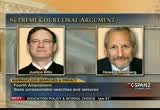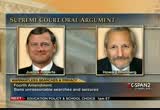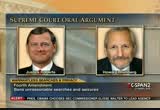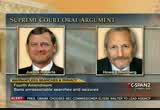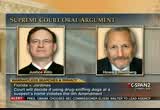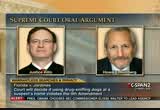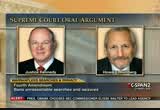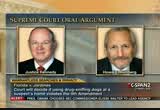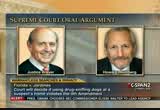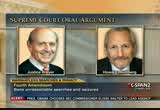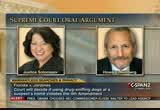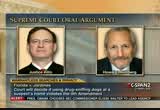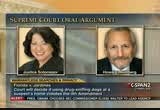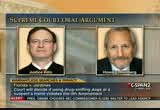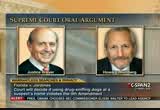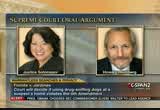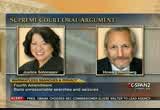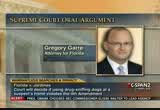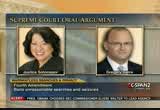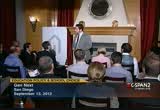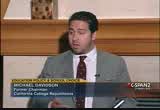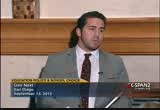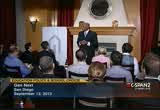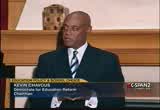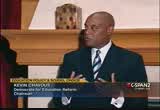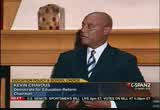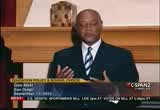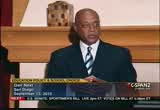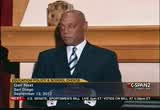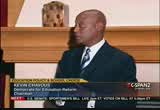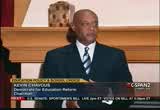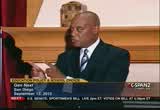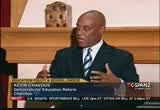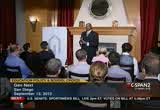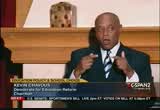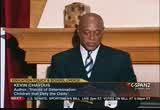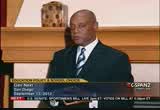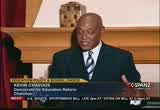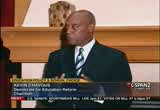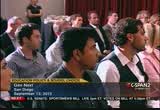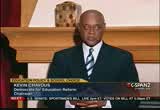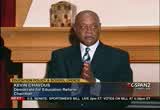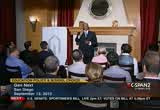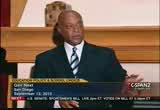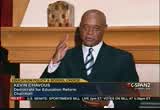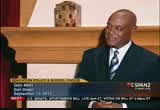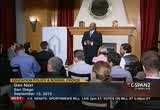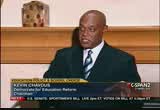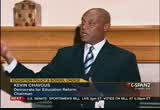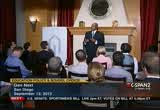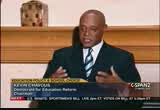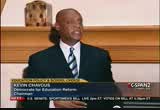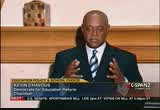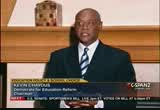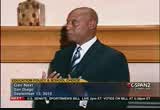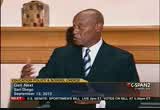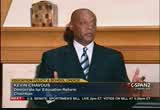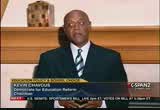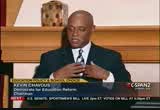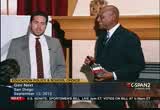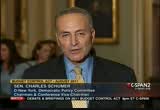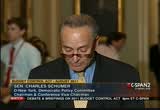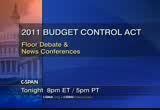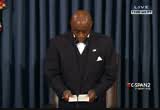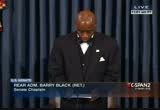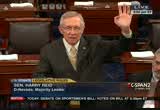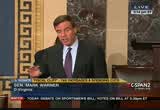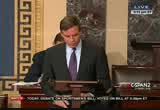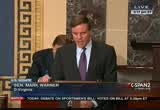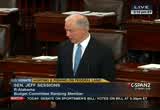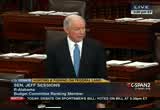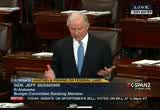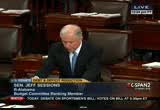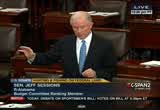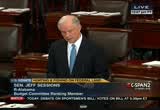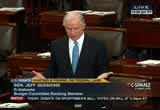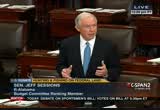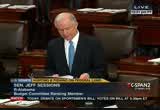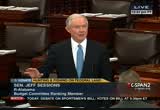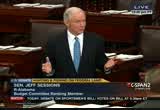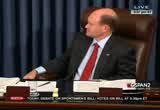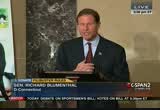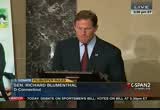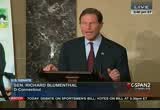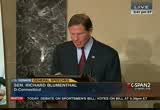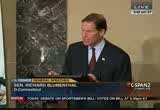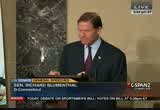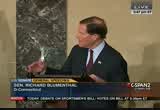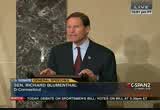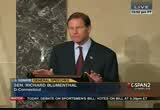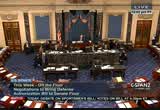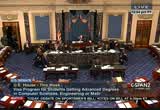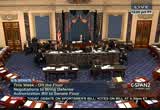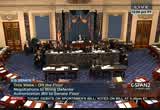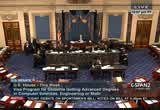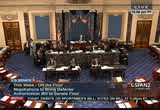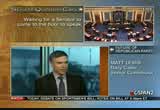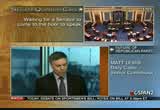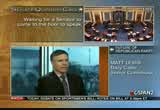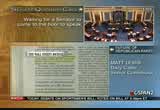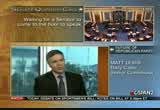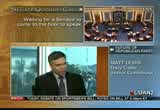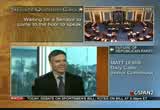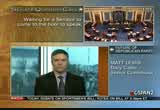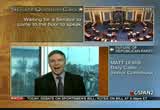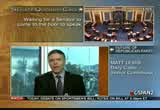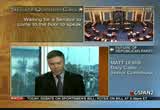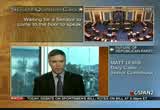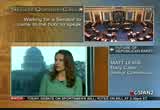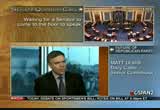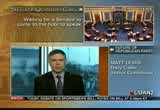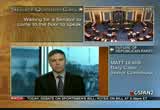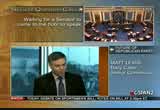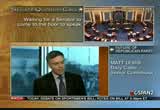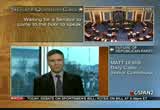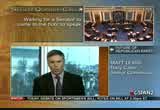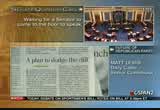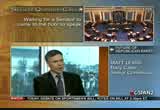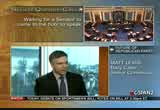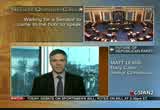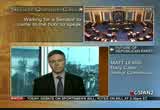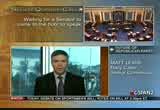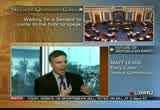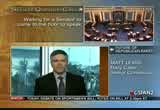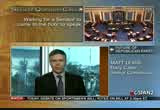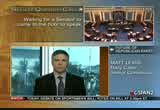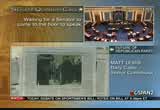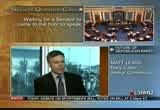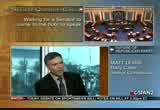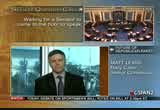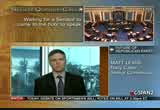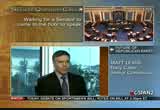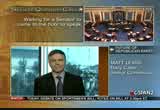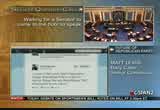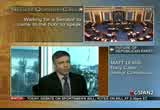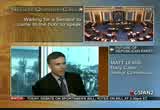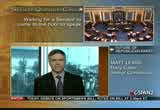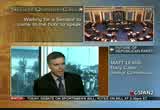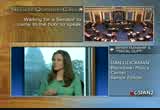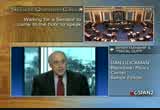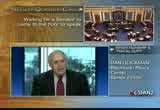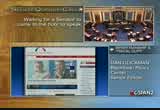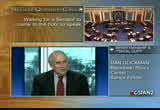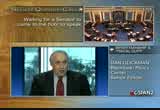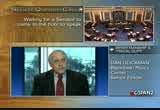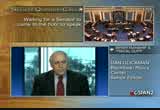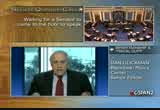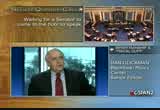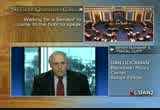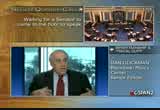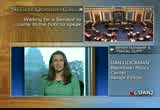tv U.S. Senate CSPAN November 26, 2012 12:00pm-5:00pm EST
12:00 pm
>> at the front of the house, outside of the house. and so what you're talking about, although we talk about what's going on in the home, really what's happening here is owner of legal contraband is being blown out into the street, and someone is coming up to it and given their god-given senses in a way that human and dogs have used for centuries -- >> so we've had a lot of discussion about whether it's 5 minutes or 15 minutes or whether it's mothballs, i understood the issue to be with us under the
12:01 pm
fourth amendment whether or not it is a search for the dog to come up to the door and sniff. we're not making a judgment on the probable cause, but the ground of the decision below was this is a search when the dog sniffs. >> you need probable cause just for the dog to sniff. no, that's a absolutely right. and the dog's sniff itself clearly is not a physical invasion in the same way that looking is not a physical invasion under the common law -- >> it isn't the sniffing in the abstract, it's the sniffing at this point. the sniffing at a person's front door, right? >> well, i mean, that's true, your honor, but i think if it wasn't a search for the police officer to walk up there and sniff and report smelling live marijuana, then it wasn't a search when frankie walked up there and alerted to the presence of an illegal narcotic. >> well, i didn't say it wouldn't be a search if the police officer himself did that if he went there with the intention of smelling at the door. he's going there to search, and he shouldn't be on the -- [inaudible]
12:02 pm
to search. >> i think it's been conceded in this case, at least it was below, that the officer could walk up there, report the smell of marijuana and that that was not a search. >> mr. garre, this is what we said, and i'm just going to read it. we said: we think that obtaining by sense-enhancing technology any information regarding the interior of the home that could not otherwise have been obtained without physical intrusion into a constitutionally-protected area constitutes a search. at least where as here the technology in question is not in general public use. so what part of that do you think separates your case from in this one? -- from this one? in other words, what part of that language does not apply in this case? >> well, first of all, frankie's nose is not a technology. it's a god-given sense in the way that dogs have helped mankind for centuries. >> so does that mean if we invented some kind of machine, you know, called a smell-o-matic, and the police officer had this machine, and it
12:03 pm
alerted to the exact same things the dog alerts to, a set of drugs -- meth and marijuana and whatever else -- the police officer could not come to the front door and use that machine? >> your honor, i think the contraband rationale would be the same. it would be different in that you don't have technology in this case, and i think that's an important distinction, because as we read kilo, the court was very concerned about advances in the technology, and that's just not true for a dog's nose. >> so your basic distinction is the difference between, like, a machine and frankie? >> well -- >> we should not understand frankie as kind of a sense-enhancing, law enforcement technology, but we should think of him as just like a guy? >> your honor, i think that's true for two reasons. one is frankie is using the same sense of smell that dogs have used for centuries. this isn't a case if you allow a dog to sniff today, he might use x-ray vision in the future. that's not going to happen. and the other thing is frankie -- the use of dogs for
12:04 pm
their sense of smell, which everyone agrees is extraordinary -- >> not this purpose. you said centuries, but i think you recognize that it wasn't til the '70s when the dogs were used to find culprits. but to use it in this way, i think it was only since the '70s. >> well, to use it for drug detection purposes, that's right. we've been using dogs to track thieves for centuries going back before the founding. scotland yard used dogs to track jack the ripper. that's the same type of way in which they're being used here. the fact is today they're looking for drugs -- >> mr. garre, there's no dispute that dogs can smell what human beings can't. is that correct? it's not that we can find machines to put it on a human being to enhance their sense of smells. dogs can do something human beings can't. >> they have a much better sense of smell, that's right. >> so you have to treat 'em like a guy to think that he is not
12:05 pm
like technology in terms of augmenting what a human being can do. >> well -- >> he's not augmenting what a human being can do, he's substituting what a human being can do. >> the dogs, no doubt, have an enhanced sense of smell compared to the office, but i think that's not functionally different than using an airplane to look into the house, like in florida v. reilly. i think this case is a lot like that. in florida v. reilly, the officers used a helicopter to fly over the house, and they saw exposed marijuana. here you're using the drug detection law to smell to door of marijuana that is being pumped out of the house into the street, and the people in the house know that, and we know they know that because mothballs were present. they're a masking agent. people don't have a legitimate expectation of privacy. this court has held knowingly exposed to the public, that's what the court said in florida v. reilly. and i think here one way to
12:06 pm
resolve it is to say people who live in grow houses with a distinct odor of marijuana who know that is being pumped out in the street because of the air-conditioning they need to run the grow houses, there's no invasion in their expectation of privacy when either a man or a dog when lawfully present on the property uses their god-given senses to detect that. so if i could reserve -- >> thank you, counsel. >> thank you. >> ms. saharsky? >> mr. chief justice, and may it please the court, i'd like to raise the two points that respond to the court's question. the first is whether the officer and the dog were lawfully in place was conceded below, and as the case comes to this court, that is not in issue before the court. and i want to make sure -- >> i didn't want understand the
12:07 pm
concession to be -- i didn't understand the concession to be that the police could come to the door with the dog, the sole purpose of the dog being to detect contraband. >> well, let me give the court's specific citations on that. the court of appeal, the florida court of appeals found that the dog and the officer were lawfully in place, pages 104, 105, 112, 116 and 10. before the florida supreme court at oral argument, respondent conceded that there was no reasonable expectation of privacy on the porch, and the florida supreme court accepted that concession. that's petition appendix page 31, also noted by the dissent in pages 78-79. in the brief and opposition to cert respondents said police could approach the front door for a knock and talk and made no separate argument about the dog being present. it is with the dog and officer lawfully in place at the front door, approaching the front door just like any girl scout, trick-or-treater or anyone else
12:08 pm
could. and just to respond, justice ginsburg, to the questions you raised, the police officer's purpose in approaching the front door does not mean that the officer can't come to the door. the court has said in many contexts that officer purpose doesn't matter. it doesn't matter if the officer was looking for a lost child -- >> so you're agreeing with mr. garre that the police could take a dog and go down every house on the street, every apartment in the building? >> well, assuming that the police can lawfully be in the place that they are going with the dog -- >> is the house just like this house? >> if they're approaching the front door using the normal path because the dog only detects contra band, yes, they could be used in those circumstances, but that's not happening -- >> any home, anywhere, and we should say that's okay, and we can say it's okay because the government won't use it? >> there are justices who have warned about this for over 30 years, and there are restraints
12:09 pm
on police resources. there's the potential for community hostility. if you look at the -- >> maybe because this court has dealt with an item that was seized before, a piece of luggage, a car. they have not dealt with the dog sniff in the context of a home. it's not -- [inaudible] >> but in -- [inaudible] where admittedly the court did not decide the issue, it distinguished kyllo and that a person, the critical distinction between kyllo ask that -- is that a person does not have a reasonable expectation of privacy -- >> i just, again, as i told mr. garre, i just can't accept that as the premise for the case. the argument we're having about whether there is a reasonable expectation in society generally, whether or not the police because of limited resources are not going to have -- [inaudible] that's all fine. but this idea that, oh, well f there's contra band, all the rules go out window, that's just
12:10 pm
circular, and it won't work for me anyway. >> well, i wanted to respond to that, justice kennedy, because that's not the case. what we're talking about here is a sniff that would allow the police to go to a detached and neutral magistrate to say that we have -- >> fine. but don't ask me to write an opinion say, oh, we're dialing with contraband, so we don't have to deal with expectation of privacy. there is similarfully no support for that -- simply no support for that because jacobson said the contraband fell out of the package, and it was in clear view. so that just doesn't work for me in this case. >> the court said the rationale, the reason this decision was in place is because when you're talking about people's reasonable expectations of privacy, they have a subjective and objective component. and the court has said over and over in place, in jacobson that you do not have a legitimate expectation with respect to contraband. and that doesn't mean --
12:11 pm
>> and i, again, i don't think the cases go that far. because those were cases in which the contraband -- jacobson was in plain view. everybody knows it falls out of the package. at that point you don't have any -- what you're saying is, oh, well f there's contraband in the house, you have no legitimate expectation of privacy. that, for me, does not work. >> what we're trying to say, justice kennedy, is not that yo lack privacy expectation in the home. all the dog sniff allows is for the police to try to go to a magistrate and establish probable cause -- >> that's fine. we can talk about reasonable suspicion. that's all okay. >> how does what you're saying, ms. saharsky, square with caro? the only thing the beeper or alerted to in the home was the can of either which was clearly an i'm that was being used for drug manufacture, and there was nothing else other than that item -- you might not call it contra band, but it was evidence of illegality, this candle of ether. and that was the only thing that
12:12 pm
the beeper alerted it to, and nonetheless we said, of course, that's a search. >> i think my answer touches on the point that you made which is it was not contraband. the police thought it might be evidence of a crime, but, actually, there was a discussion at the oral argument where defense counsel made very clear that ether has many lawful uses. that makes it different from what the court considered in place. >> not in somebody's house. i mean, maybe lawful uses in a factory or an operating room, but nobody has cans of ether in their house unless they're making drugs. >> the defense counsel i think correctly suggested that there are, in fact, lawful uses in photography labs. he actually had an expert who testified about the various lawful uses of ether this a house. the government was not making an argument that that was contraband or evidence of a crime. the government was just saying, oh, it's very limited information because we had already tracked the ether to the
12:13 pm
house. and the court said, basically what it said in powell, it might not be much, but it's still about lawful information/activity in the house, and that's protected. sure, we say kyllo o, lawful activity in the house, but those are not legitimate interests, and the court has said that again and again and again. >> but in kyllo there was already a seizure that had happened, and the court just said this is no, this is really no greater an intrusion. >> well, with respect, when we look at the language in these cases in caballas and the like, the court wasn't say, oh, it's not a search because this had already been seized and nothing more was happening. there's no legitimate expectation of privacy. and just to be clear, the question about whether folks have a reasonable expectation of privacy with respect to contraband in their house has to take into account two facts. first, that we're only talking about contraband, but also that dogs have been used and known -- >> what i'm curious about, and it's an unanswered question for
12:14 pm
me, is we are considering whether the dog sniff is permissible. so i wanted to know what a dog sniff at the front door involves. and in page 96, 97, 898 of the joint -- 98 of the joint appendix with which you are familiar, it explains that. it's a process called bracketing. they describe it at length. the officer, the dog officer said he was in a rush that day, and it didn't take more than 5-10 minutes. and my question really is whether an ordinary homeowner expects people to walk down the cartilage and -- with a big animal, and with the animal, they don't knock, they behave in the page 96, 97, 98 way. i subjectively think, well, that's pretty unusual behavior. whether it's a policeman or anybody else. so what do you respond? >> the sniff occurred very quickly -- >> it was 5-10 minutes, and it's
12:15 pm
96, 97. >> right. i think the 5-10 minutes, like counsel said, was the whole process of of bringing the dog up to the door, etc. the sniff happened very quickly. but putting that aside, the dog is sniffing things that have been exposed to the public from inside the house, smells the officer himself could smell, and the court has said in other cases like in place that what the dog is doing is very limited in scope, it happens very quickly, there's no physical invasion, it's something that, actually, this court said it's something we want officers to do -- >> could i follow up on justice breyer's question, because it strikes me as a little confusing. does the dog as soon as he or she is at the door sniff and sit or sniff and not sit, or does the dog -- i mean, you've talked about the sniff is immediate. what is the 5-10 minutes? >> the 5-10 minutes as i read the record was the whole process. the dog sniff, i think, took seconds or maybe a minute --
12:16 pm
>> and the whole process is, what? >> that they were, that they met at the front gate, that they were walking up to the door, that the dog did the sniff, that he talked to the other officer, and then he went back to his car which was parked, i think, some length of time away. >> it doesn't take the 5-10 minutes to walk to the door. so the officer walks to the door, the dog sniffs right away and then -- >> well, the dog sniff, he has to find the strongest source of to door. -- the odor. he sniffs around for a few seconds, he finds the strongest source of the to door. >> where in the record do i find the few seconds? >> probably the sites that describe it, so i'm not sure that there's something more specific than that. >> thank you, counsel. >> thank you. mr. blumberg?
12:17 pm
>> mr. chief justice, and may it please the court. police officers taking a narcotics detection dog up to the front door of a house is a fourth amendment search for two distinct and separate reasons. first, when police reveal any details inside a home which an individual seeks to keep private, that is a fourth amendment search, and that is exactly what a marcotteics detection -- narcotics detection dog is doing -- >> that's your first reason, and i don't want you to be deterred from giving us the second, but if we can concentrate on that for a second, that seems to me a proposition that's equally unacceptable to what the government is saying that you have no interest in contraband. the police often when they have ordinary conversations with people want to find out details of what that person is doing, where the person lives, what goes on in the house. hello, have you had a nice time at the park today? i see you're coming home with
12:18 pm
your children, is this where you live? this is all routine conversation that we always have in order to try to find out what people are doing, what they're like, where they live. so i think this statement, and you repeated it quite accurately from what you have at page 16 of your brief, just goes too far. this doesn't establish police action which reveals any detail an individual seeks to keep private is a search, that is just a sweeping proposition that, in my view at least, cannot be accepted in this case. i think it's just too sweeping and wrong. >> justice kennedy, i would add a few words to the end of that statement. anything that an individual seeks to keep private in the home, and that's the difference. your hypothetical about conversation, certainly, a police officer can talk to someone and ask them questions -- >> well, the police officer talked with shop at the police station -- somebody at the police station, walking down the street about what their occupation is, they're trying to get information, that's perfectly legitimate.
12:19 pm
>> absolutely. >> then your broad statement does not work. >> suppose you have someone who has been guilty of a crime, he has the body, he's admitted a murder, and he has the body in the home, he certainly wants to keep that private, right? and he foolishly and mistakenly leaves the blinds open in the room where the corpse is lying. and a policeman at a great distance has a telescope, and he looks through the blinds, and he sees the corpse. can the police go into the home? >> in that situation the person inside the home has knowingly exposed what is -- >> oh, no, he hasn't knowingly. he was careless. >> well, but i understand in your hypothetical -- >> he certainly wanted to, he wanted to keep it private. >> well, certainly, and the defendant in reilly wanted to keep the marijuana private. >> well, you could say the same thing here. they wanted to keep private the fact that they were growing the marijuana, but they used a means
12:20 pm
of suppressing the heat that made it implausible to keep it private. >> well -- >> they were careless. >> i don't believe there's anything in the record to indicate that the air conditioner was blowing the smell of marijuana out from the house in this a very strong manner. >> mothballs. >> there were moth balls there, and detective bartel, the dog handler that was standing at the front door as well, testified without contradiction or without hesitation he didn't smell anything. so if mr. garre's representation about an air conditioner basically blowing the smell of marijuana outside the house so that anybody -- >> what were the mothballs there for? >> the mothballs presumably were there to mask the smell of an odor coming from the house. manifesting an expectation of privacy. >> well, that's my question. are we talking about the expectation of privacy in the marijuana or the expectation of privacy in the odor?
12:21 pm
>> the expectation of privacy on the, in the details, what's going on inside your house. >> well, no, ha can't be right -- that can't be right, because if you're letting smoke out that, i don't know, from the burning of a body or something, you don't say, well, because he's trying to consumer that, you can't rely on the smoke. >> but that's knowingly exposing what's -- >> i guess the question here is you are going to put mothballs all around the house, it seems you may have an expectation of privacy in the marijuana plants, but you don't have an expectation of privacy in the odor, because you're emitting it out into the world, and it was the odor that was detected. >> but assuming that's what the mothballs were there for, that's to keep the odor inside the house so the public cannot find, cannot detect the odor -- >> that's like saying you put the drugs in a bag to protect them from observation on the outside, but you use, you know,
12:22 pm
a clear bag rather than a, you know, opaque one. you weren't very successful. but you began, you said assuming that's what the mothballs were there for. that is what they were there for, isn't it? there's no other reason -- >> there's really no evidence in the record as to -- the only people who testified on the motion -- >> well, i think your first reason is so broad, is clearly incorrect. it's so broad. you ought to go on to your second reason. >> yes, i was going to ask for your second, your second point. >> well, when a police officer takes a narcotic detection dog up to the front door of the house, that is also a fourth amendment search because that is a physical trespass upon the constitutionally-protected area of the -- >> you know, we've had hundreds of years of trespass cases in this country and in england. has there -- do you have a single case holding that it is a trespass for a person with a dog to walk up to the front door of a house? >> well, there are cases that go back to -- i'm sorry, i don't
12:23 pm
have the citations, but there are cases in the 1700s that establish that, basically, a dog running onto someone else's property is a trespass. >> that really wasn't my question, was it? >> i thought my question was if a dog comes onto -- >> if a dog on a leash is brought up to the front door of a person's house, was that a trespass at the time the fourth amendment was adopted? >> if it was without the consent of the homeowner, yes. >> and what is the case that says that? >> i do not have the case. >> you're assuming the conclusion in these things. i thought since katz the rule has been whether the homeowner has a reasonable expectation of privacy. which is infringed or violated or interfered with when the government acts. it's a question of does he have that reasonable expectation, so now we're back to exactly where we were. your opponents say, no, there is no reasonable expectation of privacy.
12:24 pm
well, a person with a dog coming up to the door and going -- all right? now, your response to that is what? >> my response to that is that does violate the resident's reasonable expectation of -- >> and then the question was, as justice alito put it, why? he says we go back to the 17th century, as far as you want, and there is no law that says there is any kind of expectation in a homeowner that a person won't walk up to the dog -- to the door with a dog on a leash and sniff. which is he says, which as your opponents say is what happened here. and your response to that is? >> my response to that is any entry onto private property in the 1700s was a trespass, was the tort of trespass unless it was with consent. >> what about, mr. blumberg, the government cited many pages in the record, the first one,
12:25 pm
petition -- appendix to the petition 104 and 105. the court said the office and the dog were lawfully present at the defendant's front door. and we were told that that was conceded by you a number of times. >> absolutely not, justice ginsburg. what i said in the florida supreme court, i was given a hype net about an officer coming up by himself without the dog to knock on the front door and talk to the homeowner. and i said that i -- i conceded that would not be a violation of a reasonable expectation of privacy, and this court has stated as much in kentucky v. king. and then the court said to me, what's the difference, and i said, the dog. and that's exactly what i'm saying here. >> okay. so if that's really -- you do concede if the police officer walks up to the door, smells it himself, no problem there, is that right? >> if the police officer is performing -- is knocking on the door, part of a knock and talk, yes. >> but if he smells it himself,
12:26 pm
so there's no problem there. so the difference is the dog. so what difference does the dog make? suppose the dog were not doing this 10-minute bracketing that justice breyer was talking about, suppose this really were a very simple procedure, the dog comes up, takes a sniff, barks, sits down. the dog's not a scary looking dog, the dog's a cockapoo. [laughter] so just like, you know, your neighbor with his cockapoo walks up to your door off all the tim, that's what this police officer has done can. >> well, whether it's a cockapoo or frankie from who appears to be a very cute dog, it's not what the dog looks like -- >> the dog does what your neighbor's dog does. >> well, no, the neighbor's dog does not search for evidence on your front porch. >> mr. blumberg, i think you're, with respect, misguided to concede that if it was just the officer alone without the dog,
12:27 pm
it'd be perfectly okay. >> i did not mean to concede that -- >> well, i thought you did. >> i was about to return to your -- >> and i would assume that you would say that if the officer walks up there with no intention to walk and talk but just walks up to the door with the intention of sniffing at the door, you would consider that to be a violation, wouldn't you? >> and that was the point i was going to make -- >> well, our fourth amendment cases are very clear that they don't turn on the subjective intent of the particular officer. >> and i am not arguing that. >> i thought you just said it depends on whether or not he's going up to the door to sniff or going up for something else. >> it depends what the officer does at the front door, not what his state of mind is. if the officer goes up to the front door and starts sniffing around the cracks and crevices -- >> yeah, sure, if he's down on his knees, but what if he goes up to the front door and sniffs? how do you tell whether it's different? i don't understand. he's going up to drop off, you know, tickets to the policemen's
12:28 pm
ball, and he smells marijuana. what is that? is that a violation or not? >> it is not, because he's not -- [inaudible conversations] >> but if he's going up to sniff, it is a violation. >> not going up to sniff. if he goes up there and does sniff, starts searching around, looking in the windows. >> he goes to deliver the tickets, and he sniffs. he doesn't intend to sniff before he goes, but he goes to deliver the tickets, and he smells the marijuana. is that a search? >> no, because he's not performing any kind of search. and this court has repeatedly held -- >> officer is doing exactly the same thing. two officers go up to two identical houses. one with the subjective intent to sniff, one with the subjective intent to drop off the tickets. >> i am not in any way or form trying to -- >> i think you're wrong to accept that. i think you cannot enter the protected portion of a home with
12:29 pm
the intention of conducting a search, that that is not permitted. i think our cases establish that. >> i believe the language -- >> it's fine to say i don't think it's true that the intent of the officer is never relevant. it is relevant in that context. the reason for the officer going onto protected property if he's going on just to knock on the door to sell tickets to the policemen's ball, that's fine. if he's going onto conduct a search, that's something else. >> the language in this court's opinion in jones is for the purpose of conducting a search. >> can to doors be in -- can odors be in the equivalent of plain sight, plain smell? the door is open, he sees the dead body. the officer goes up to sell the ball tickets, and he sees, he smells the marijuana. okay in both cases, right? >> yes, mr. chief justice. >> so this depends upon how strong the odor is. >> this court's decisions establish that a police officer does not have to close his eyes
12:30 pm
when he goes up to the front door of a house to do a knock and talk, he does not have to hold his nose to prevent anything that he naturally observes using his ordinary senses when he is there for a lawful purpose such as a knock and talk is fine. >> if the -- let's say it's a townhouse that goes right up to the sidewalk. if the police go by with their dog intending to sniff, and the dog alerts on the sidewalk but two feet away, that would be okay? >> well, that would not be a trespass. no, it's not okay, respectfully, because the dog would still be revealing details inside the home that the officer could not reveal using his or her ordinary senses. that's our first argument in this case. ..
12:31 pm
12:32 pm
people in 1791 would have thought about it but that isn't true. why they've been around for 10,000 years. and they have been used to detect for thousands of years with what for. but in 79 naim deacons -- 1791 they hadn't been trained to detect criminal activity within the house. 1791 if the police were using or somebody was using a bloodhound someone suspected of a crime and they used them to attract would that have been regarded as a trespass? what is the case that says that?
12:33 pm
>> i do not have a case that says taking a blood count up to the front door of the house would be trespassed he but the definition what trespasses other cases say the implied consent exists only where the person is coming to the door for a purpose that the homeowner would approve if the homeowner knew the purpose of the person coming to the door. >> it is condemned by custom and so you look to what is it customary for people to accept in terms of people coming on.
12:34 pm
when because we say there is there is and if there isn't there isn't. if we are looking at community values and general isn't a reasonable expectation of privacy? >> it's a very similar. whether you are singing is a violation of an expectation of privacy -- >> let me ask this your answer is they have little microphones so they can talk and to the radio, the microphone on their lapel. support mur can hear the conversation -- so the partner can hear the conversation. is that an unlawful search? >> if the homeowner chooses to engage in conversation with that officer -- >> it doesn't occur to him that that mic is on?
12:35 pm
>> when you talk to a police officer that is a reasonable expectation that if you talk to a police officer that might be going out to one of the police officer that's in the car down the street but there is no -- >> but maybe it is a reasonable expectation and maybe it isn't. i think that might be the case that you can make a stronger case for a reasonable expectation of privacy. if the homeowner is making marijuana with voters coming that a person or a dog might smell it. >> but again this particular case is not the question presented does not hinge on whether or not a normal officer can smell it because this officer -- >> what is the reasonable expectation and that is what we are trying to find out? >> i will look at this later. but my understanding of the case is the chief justice, and i thought what you're supposed to look at is the behavior of the
12:36 pm
individual police officer who comes to the door or looks into the house, not the subjective motive. now as we just heard, you heard in the support here jones changed that. jones is the case where the police did in fact go to the person's car and physically put something in it. that's something of fact. that's behavior. estimate of the definition -- >> what is it that said what we are supposed to look at is not behavior but the subject of intent of the officer? stand it's the language that says one of the elements in determining whether or not a physical trespass constitutes a search under the fourth amendment is a physical trespass on to a constitutionally protected area for the purpose of conducting a search. those are the three elements.
12:37 pm
>> in the protected area in this case. >> and looker knowledge of the home even where there's an implied license for people to walk up to. >> they have the license to walk up to the front door, right? there's an implied license to go up to the cartilage. curtilage ascent sacrosanct to do certain things. >> such as to sell girl scout cookies. even a police officer can go knock on the door, i'm sorry, not on the front door to try to engage the person inside of the home and get a conversation. >> can we go back to the positions that were asked of you in the court had you conceded that the police officer's doggett he had come up to the door and knocked that would have
12:38 pm
been permissible but that wasn't a search or seizure? >> with the police officer was doing at the door was say knock and talk. >> did he have a right under the fact of this case is told in this house they were growing marijuana so that all that he had. would he have the right to walk up to the door and start asking questions? >> without the dog. >> yes, dennis kentucky i believe. >> so you are conceding that he had relations to walk to the door and ask questions? >> the have implied consent to go up to the front door, not on the door and attempt to engage the person in the house in conversation. >> why is that if you took a poll of people and you said do you want police officers who suspect you of possibly engaging in criminal conduct to come to the front door so they can talk
12:39 pm
to you and attempt to get incriminating information out of you would most people say i consent to that? >> in terms of consent it is implied by custom, and i think at this point it's customary for people to expect the officers may come to your front door to try to talk to you. >> the bottom line is are you taking the consents. >> there's an implied a consensus for your neighbor to bring the dog up for anyone else but a police officer is that what you're saying is in plight comes in for anyone else were there is no implied consent period? >> a strong argument can be made that there is no implied consent for anyone to bring of all gup to the front door of your house because as you pointed out some people are allergic to dogs.
12:40 pm
>> nordlinger. when it is a dog trained as a contraband there is no question that no one imply you'd become sense that happening and there is no question as justice breyer pointed out that a homeowner has a reasonable expectation of privacy that there isn't going to happen. >> there is a distinction between dogs that are not detection dogs and ordinary dogs would you draw the same distinction about a police officer who is not expert at detecting the smell of methamphetamine and a police officer who is expert at detecting the smell of the drug? >> in terms of the right of that officer to come up to the floor? >> there wouldn't be any distinction of that. you imply the consent and have no reasonable expectation of privacy that any type of police officer is going to knock on the
12:41 pm
front door and try to talk to you. >> not a police officer. they have to know how to behave and in this area they can be hit the same way as other people can be a and we expect them to believe even though they are always trying to fight crime. that's what i thought all was. i've been trying to figure out what you've said that in a slightly different form. do people come up to the door with dogs? >> yes. >> to the brief? >> yes. >> to policemen like other people come up and breathe? we expect it? yes we expect people to come up and leave do we expect them to do what happens here, and at that point i get into the question what happens here? and i would be interested in your view on this. >> to clear up the factual, i don't believe that what happened here in terms of the drug detection dogs five-to-10 to the
12:42 pm
to 15 minutes. >> i would say at least one or two minutes because what happened again this is on '96, '97 and '98 the officer goes from the street over the curb at the front door of the house with a doll to basically driving at the front door of the house. they go up the walkway and the picture of the home and the dog passes out into the alcove and the ball starts violently going back-and-forth pulling on the leash and they testified that the other officer had to stay back because it was so violent that people could get knocked down by what's happening and they go back and forth goes back to the crack on the bottom of the front door and as he finally stops he sits down. so that is factually what
12:43 pm
happened. >> they did say that the officers only dog. >> i did not make that concession, and i certainly didn't concede that it is the point i wanted to make. that is the issue justice ginsburg. it is a whole section in the district court of appeals saying the officer and the ball were lawfully present. they didn't, it doesn't say the defense council concedes that issue. that part of the opinion goes refined if the officer and the dog were present. >> as a statement of the florida law i'm sorry i didn't hear the beginning. do we have to accept that as a statement of the florida law? >> the issue is whether or not
12:44 pm
that is a violation of the fourth amendment, and just because the third district court of appeals that is with the florida court did and the issue goes before the court. the third district court of appeal decided the officer had the right to go up and be there in the front. the florida supreme court disagreed. it is a passage in the decision in the supreme court an officer going up to the door can do a knock and talk but when they go up with a narcotics detection dog is a qualitatively different matter. people have different senses of smell. what if a person runs the best sense of smell in the department and they say lets him to do the knock and talk when we expect drugs that way we may discover the owner of marijuana when other people wouldn't. is it wrong for them to select the person with the best sense of smell to that?
12:45 pm
>> i think the lead to a determination that there was a trespass because they selected the officer that had the best sense of smell to go to the door so they were not really going -- u.s said knock and talk is okay. >> they are okay but under your hypothetical it appears that the knock and talk wasn't really what the officer was going up for. >> you are on a really slippery slope with that answer. there is still a motive with everything the police officers do. they are not to hold the person comes to the door and that they can see something from the door. they always have a motive, you are suggesting what? in terms of our rule deselect everybody with a sense of smell because they have a tip of drugs in the house that we given that situation? the assumption that they went to investigate? >> the rule and asking the court to rely on is not the intent of the police officer.
12:46 pm
the rule and asking the officer -- >> he asks the neighbor who are you? i've gotten a report and i am selling drugs. i know you have drugs in there. >> that would be fine. it would be planas now. >> if it smells first and ask the question second that's not okay? >> what's not okay is if he goes up there to perform a search or if he conducts a search, and again, back to the fact of this case when the police officer goes up to the front door with a narcotics detection dog there is no question but that officer is doing. that officer is performing a search. therefore if you go to jones, the officer and the dogs have entered because there is no consensus to do that on to a constitutionally protected area the curtilage of the home and perform the search. if you follow the test set forth and apply it to what happened here and the question that is presented here it is atrocious.
12:47 pm
>> i thought the rationale of jones, what he added is that it is the search of it was a trespass. so i come back to the very first question i asked you you have any authority for the proposition that this would be a trespass? in the case any trespass case and any english-speaking country. >> i don't believe any court has to face this issue whether or not taking a police officer the front door of the house is a trespass under the common law. >> thank you, counsel. >> you have three minutes remaining. first is the question of how long they were at the scene and the record says they were at the scene that includes in the car, walking up to the door with respect it means the dog is getting excited moving his head around. this is a pass and alert dog and
12:48 pm
they sit down. it's no different than what a neighbor's dog can do when they get to the front door. second with respect to the state law it's important and florida has the decision. >> according to the police officer's testimony, she gave them a long leash so the dog would lead him to the drugs or did i thought according to what i read go past the motorcycle to make sure the officer said this you don't know if the drugs are in the motorcycle, you don't know if they are in the garage, you don't know if they might be said the dollar is permitted to roam around until he catches. is that accurate? >> they are working at the common path to the brief and then up to the front door what he alerted by sitting down. >> about she is setting all the way around. >> with respect to the state law
12:49 pm
at four lead and for a - this is a case that came up during the oral argument in the supreme court that says under the florida law there is no reasonable expectation of privacy taking into account visitors and salesmen can come up to the front door, and i think that is pertinent here. justice kennedy, if you don't like the contraband rationale, then i hope he would consider public rationale. here the record does show the drug houses do put this stuff outside of page 848 in the joint appendix and talk about what it does to the scent of marijuana in the house. we know that the new about this because the officer can across mothballs and that is on the joint appendix outside of the house the mothballs for outside of the house. >> this is a case about the technology, whatever you want to call light of something that enhances what normal people can
12:50 pm
sense and then the question becomes do you have a reasonable expectation of privacy, and basically people just having their normal senses rather than some technique or method of technology that enhances the senses. so this might differ fundamentally the neighbor comes and knocks on your door or does the neighbor bring his magnifying glass and microscope and everything else and start testing everything around it you might say i am not there for that. >> i think that goes back to the point this is a doll that has been used by humans and that is quite different than the helicopter that was used for the aerial surveillance. >> thank you, counsel. >> the case is submitted. >> the supreme court has revived
12:51 pm
a christian challenge to president barack obama's told care overhaul with the acquiescence of the obama administration. the court ordered the federal appeals court in richmond virginia to consider the claim by liberty university in lynchburg virginia that obama's healthcare law violates the school's religious freedom. a federal district judge rejected the claims and the fourth u.s. circuit court of appeals or read the lawsuit was premature and never dealt with the substance in the school's argument. the supreme court upheld the health care law in june. also today the court announced its leaving in place the corruption conviction of a former louisiana congressman who had many in his freezer. justices rejected without comment an appeal by the former representative william jefferson serving a 13 year term in federal prison. he was convicted in 2009 after fbi agents investigating obligation from corruption found $90,000 in cash hidden in
12:52 pm
12:53 pm
you listen to me your bloomberg who said the damage was unprecedented, that it may be the worst storm the city has ever faced and was 10 feet, governor christie said the damage in new jersey was unthinkable when we had five years, hurricane wind, we had, you know, massive flooding and you look at the city's shut down of the stock exchanges we start to get a sense of the scale and scope and yet the networks perform. i've read dozens of stories the last couple of weeks have many consumers there are only a link to information, the only tied to any sort of affirmation or people with through their smartphone, so while there was obviously an impact on the sites the networks performed really pretty well. >> some networks did well, some did less well, but we don't
12:54 pm
really have sought the information about those because there are no reporting requirements on these networks. there are no standards by which we measure the performance and it's entirely voluntary whether they want to put to the cutoff to the fcc or not to talk to the state and local government or not. i think they will work for it but they responded well into the anecdotally heard some of these guys did less well and the first step is we have to find out who did well, who didn't do well and how to make sure that everybody is doing well. now we look at education policy, school choice and u.s. competitiveness. the chairman of the group democrats for education reform and he spoke recently to a group at an event hosted by gen next.
12:55 pm
>> thank you for coming tonight. we appreciate it. i hope you have a good time and learn quite a bit about gen next and about the topic tonight which is education. first i will tell you little bit about gen next. br an invite only organization that's really accomplished successful forward thinking on to the new workers and executives. the reason why we have this type of membership is because we believe in developing and a sort of the playing and in aging talent. our mission as the man replies, gen next, is purely generational opportunity. we want a future to be at least as successful as the past. and you hear some debates about the best days are behind us. we don't really like that narrative. we want to change it. if you don't like what is being said, change the conversations we are getting really interesting successful people involved to change this conversation and that is gen next. so we do cool things like this to get exposed an important issues and ideas and then hopefully get you active to help make a difference and change the
12:56 pm
world because you are all interesting and successful people and your talent and resources can be used to be even more accomplished. the economics education and security one is education. now, education is arguably the most important issue because that's how you get through the generational investment, preparation. there is a moral element which is you are giving a kid a shot but there's an economic element which is you need to develop your human capital to get ahead to compete especially in the world like today that is more competitive than ever and we're struggling a lot and education right now as a country. you read the news the teachers in chicago on strike they are hungry, ambitious, educating their kids coming and we cannot just refocus and marshall the energy and the priorities of our
12:57 pm
country to get ahead of it. so, we brought a speaker tonight who is extraordinarily influential and a true inspiration on this issue in an. there is a quotation that when it comes to the future there are three types of people. there's those that let it happen, those that make it happen and those that wonder what happened. our speaker tonight is kevin chavous and he makes it happen. he is a businessman, he is an attorney, he's a bit of an entrepreneur but that makes some remarkable. what makes an extraordinary is that he's a true leader. he was on the d.c. city council and helped start the felker program. he wrote a book called voices of determination which is in the back and encourage dewaal to check it out and it is a testament to how kids can be an example to adults and overcome great odds and a true
12:58 pm
inspiration for why this issue is so important and why we need to invest and read on this issue. he's also a founding member for our children and he advises governors, legislators, congressman, you name it, all across the country on choice and charter and education issues at large. so he is in what the thick of the game and without a doubt of a leader on this issue and feel this across the country. we are very fortunate to have people like him who are entrepreneurial and accomplished but dedicate their talents to leading and shaping the future generations will inherit. so please, give him a round of applause. kevin chavous. [applause]
12:59 pm
>> i think i can go home now. i was worried to you were talking about. [laughter] so, good evening gen next. i love gen next. she's like my brother from another mother. we will talk about that. when we talk that education, it's true that while that is the focal point, it is and should be the focal point of the century. i like to tell people that on my way to public service i found my passion. i got into education largely because as an official from washington, d.c. why would visit schools and talk to teachers and i remember after i was elected for the first time in 93 and i would see a couple of bright white kids in these low-income communities, troubled, challenged neighborhoods, troubled, challenged schools,
1:00 pm
and then what is that kids story? the teacher tells me those children seem to be so energetic, so effervescent, so much potential and then lo and behold a couple of years later what happened to that kid? he dropped out. he got caught up in the streets. .. >> we reduce the murder rate by 20%. and so all of these indicators
1:01 pm
are out there, that there's nothing more important than education. so i just became passionate about this. and even to the this day, 15, 19 years later, it's the only thing that keeps me up at night, to know that there are children who are going to wake up in this country who are going to go to school that won't serve them well. and over a short period of time whatever potential that today had, that they were given through stent of birth -- through accident of birth, they will lose. and there's something tragic about that. so, yeah, i was out in front. i said, you know, while we look at all this stuff out there and this idea of having this one approach tailored to fit all kids where you're put in a circle in a square, that doesn't work. because what a child needs who comes from a certain dysfunctional background or comes from a poverty background, that child can still get what they need to learn, and we don't need to write that child off. and there are countless examples of people, entrepreneurs,
1:02 pm
educators, people who believe in these kids, who invest in these kids who find a way to get them to learn. and yet when we say that, no, every child needs to take algebra in ninth grade like your mama and your grandma ma, what about that child that's ready for it in seventh grade? or what about that kid that should be taking it in tenth grade? and the problem with traditional public education as i saw it when i became a student of this stuff in d.c. is that we don't meet children where they are. wewe try to force them into learning the same day, the same way and the same things. at the end of the day, that's when i began to embrace change. so what does change look like? well, in d.c. i was very fortunate, i was one of the leaders when i took over there as case committee in pushing our charter movement, and now we have one of of the most prolific charter movements in the country, 43% of our kids are in
1:03 pm
charter schools, and their test scores are 20% higher than the traditional d.c. public schools. and then we had our voucher program, the first federally-funded program that allowed kids from low income communities and neighborhoods to go to private schools, schools like sidwell friends where the president sends his kids and kids who, you know, can go to a national cathedral, gonzaga. now we've got nearly 2,000 kids and have had this for the past seven years, gone to these schools. and it struck me after seeing the success of these programs that that has, in effect, jump-started some change in traditional d.c. public schools. so now all the innovations that, you know, the school system wanted to do for many years, now they're beginning to. so where are we? well, obviously, in d.c. like other cities we have a long way to go, but what i have found is that these innovative and
1:04 pm
creative programs, what parental choice does when you give these parents options to help kids, help meet these kids where they are, it allows us to what i like to call fly the plane while we fix it. because people, people want to put us in these boxes where, you know, you either support traditional public schools, or you're against traditional public schools. or you're a democrat, and you're going to support, you know, some of the status quo pronouncements, or are you going to be a progressive and support innovation creativity? see, i don't think it's a zero sum game. and i came to realize that when it comes to educating a child, there's no republican or democratic way to educate a child, there's no black or white way to educate a child, and there's no rich or poor way to educate a child. when it comes down to the basis of learning how the to read and write and count, there's two things that important.
1:05 pm
one, you have a student who's there who wants to learn and, two, you have a teacher who is quality-based, who has a passion for educating these kids. and i have seen over the past several years that where we're falling short is we are so stuck on the way we used to do things that it's really affected our ability to be competitive. now, michael mentioned the economic argument. you know, mckenzie and company did one of the first-ever analysis of our failure to educate our children, and they looked at what they called the several achievement gaps. the difference between the education attainment of children of color and their white counterparts, the educational attainment of all low income children in this country and their counterparts with means, and then the educational attainment of all school children compared with school children across the globe from other industrialized nations.
1:06 pm
and when they finished this report, they said it was interesting. they said our failure to close these gaps, if we had diligently worked to close these gaps ten years ago, we would not have suffered the recession we have now, and our failure to do so has led to a permanent national recession larger than the one we're currently experiencing. they said, in effect, that it has taken $2.3 trillion to our gross domestic product. money we would have had added to the economy of this country but for our failure to educate these kids. so now where we are is we're in a place where we're playing catch-up with countries that used to crave to be like us. it's so bad now that while our university systems are still where they should be in terms of reputation and attainment, no one really from other countries wants to send their kids over here to go to our k-12 schools.
1:07 pm
they do that there, and then they say, okay, we'll try to send them to some ivy league school or some good college in the states. and we're at the point now where we need to seriously look at what is it going to take to change that dynamic. well, you know, in recent days we've heard about the teachers' strike, and i think that the big challenge we have is we put ourselves in these partisan boxes, and we force people when we talk about education to take sides. and you know the side that's never adequately represented in these discussions? these kids. so i just posted on my blog, i said, okay, how will a teacher strike in chicago help kids? and, you know, after getting all these responses from people who love teachers, people who are
1:08 pm
married to teachers, you know, i had 20, 30, 40 people just start immediately responding. no one could answer that question. and they start talking about, well, you know, teachers don't want to have the evaluations that the mayor wanted them to have. or, you know, this tenure issue, you know, teachers want to make sure that the first ones that are fired -- that are hired, you know, are the ones who are laid off. some of those ones that are going to be laid off maybe shouldn't be in the classroom. that doesn't matter. but no one talks about the fact that anytime you take these kids out of a classroom, particularly kids that need more time on task, they lose. who is thinking about the children when it comes to these issues? what's interesting is recently in boston they reached their agreement on their teachers' union contract, and they have been fighting over for the past two years, and their contract that they just agreed to in
1:09 pm
boston is very similar to what is on the table in chicago. but boston has a no-strike clause. and even though they've been fighting over it for two years, they got a mediator from washington, d.c. to come in and work with these folks, work with both sides. they settled this thing. at the end of the day, no kids lost time, you know, out of the classroom. we're at the point now where -- and i believe -- that we need to evaluate these educational proposals based on one simple yardstick: will this help a child learn? and if the answer is yes, we should be for it. if the answer is no, we should be against it. so what will it take to change the dynamic? well, you know, there are a couple of things here. the solutions lie in, of course, accountability and quality teachers and autonomy. but, you know, one of the solutions also is parent choice. you know, i see as i go around the country that the more participants step up -- parents step up and they speak out and
1:10 pm
they pressure the system to change, the more they have to respond. see, the fallacy is that we expect that bureaucracies will reform themselves from within. and i don't know about you, but in my experience i don't know any example of any bureaucracy that is changed from within. they only change through external pressure. and, frankly, the best form of external pressure is parental choice. it's people who put a demand for something different. and when they, when they see what i have heard parents who had the benefit of quality schools that otherwise they didn't have, when i see and hear what they say when they had their kid in a good charter school or a good private school and that they can go to the neighbor school for the next kid coming up and say, you know what? my cousin has it over here, how
1:11 pm
come i can't have it over there? that's what's going to change the system. the other thing that needs to happen, we need to change this mission. one of the reasons why chicago lended itself to all of these adult issues and these adult can interests is the mission wasn't clear. and, in fact, the mission in our school districts aren't clear. do you know what the mission is for most school districts and teachers? it isn't what it should be. see, we need to realign the mission in this a way where there's only one thing that's important, and that's the academic attainment or achievement of these kids. right now that is not the mission in chicago. the mission for the teachers' union and the leadership was we want to maintain the integrity of tenure, want to make sure that we're not giving evaluations that we don't like, and we want to make sure that we
1:12 pm
get our step increases and paid accordingly, you know, in lock step with the way it's always been. nowhere in the discussion was there talk about the academic achievement of chirp. of children. so if we go back to my general proposition or premise that we need to make sure that we have front and center will this help a child learn, just imagine if school districts across the country adopt that as their mantra. so when i said that to one teacher, she said, well, how would that help me? how would it help you? well, one thing that would happen is if we allocate money on a per-pupil basis and everyone knows the goal -- and i know gen nexters are entrepreneur in spirit -- you tailor everything you do and have toward meeting that goal.
1:13 pm
the school district said our objective, our goal is to be -- have all of our kids at 90-100% proficiency. so what do we have to do for little johnny and jane who comes from a poor neighborhood who may not have the support at home, but how can we make sure -- because we can't get to 90 or 100% without johnny and jane. what do we do? well, we've got to have the best teachers in front of johnny and jane, the best resources there for johnny and jane. and then the way it helps teachers, the things that a lot of teachers complain about now in some of our urban core school districts and schools where they don't have supplies and blackboards or, you know, they need to have books, well, all that's taken away because a lot of the additional extravagances that we see in central administration would just disappear if everyone's main goal is the education of these chirp. i think that's something -- of these children. i think that's something we really need to focus on.
1:14 pm
and then finally, and i want to make sure i take some questions. i know there's going to be a lot of softball questions, so i'm looking forward to that. [laughter] finally, we've got to feature these stories that work. i mean, michael mentioned my book. i decided to write "voices of determination" because as i go around the country, i've been in nearly every state and, you know, when i give speeches, when i visit schools, when i talk to policymakers, i generally try to visit schools. and i always ask is the question, tell me this kid's story, tell me that kid's story just like i did when i first got involved in this, and it became my life's work. and do you know what's interesting? i'm amazed at the resiliency of our kids. see, oftentimes it doesn't take but one or more little, positive influence in some of these chirp's lives to change -- in these children's lives to change their life trajectory. and so it struck me that, you
1:15 pm
know, even we saw it in chicago, you know, we see it when people talk about performance pay, when they talk about a lot of the no child left behind, it's so easy for it to feel like it's not personal to us. the policy stuff is like numbers or words on a page. but if i would go around the country and visit schools in rural and urban america and find out that kid's story and this kid's story, i said, you know, we've got to share these stories. because, you know, we're in a nation of storytellers. and when you hear the stories, when you connect with the stories, when you connect with the passion, when you connect with the challenge, it helps you get motivated to embrace solutions that work to meet that challenge. so i ask great school operators
1:16 pm
from around the country to introduce me to some of their most successful stories. kids who went through challenges but overcame the odds. you know, like the farm girl in this indiana who -- in indiana who was a member of the national honor society but knew she wasn't up to grade, up to her grade level. and she, you know, used to skin pigs and do all that stuff, hunt. she appeared to be a country girl, an old school country girl. and she's 14 years old, and she said i want tock a veterinarian -- i want to be a veterinarian. her name's jamie. she said, but i can't be a veterinarian when they're giving me grades that i haven't earned. because i have to be strong in math and science. so she begged her mother to home school her. her mother said, i don't know what i'm doing. solo and behold, they found out about a charter school that was a few miles down the road that
1:17 pm
had just opened up. and she went there and found out that she had a learning disability that had never been diagnosed. turned her life around, and now she's doing terrific. or the young man who was at a high school in st. louis, and the teacher ended up knowing this guy had challenges with his mother, he had been abused by her boyfriend, and, you know, but the mother wasn't giving any support, but the teacher said this kid is smart. and the child's goal was to graduate. and he knew that his mother would kick him out of the house every now and then at 15, 16 years of age. and then the teacher noticed that this young man was always at the school. you see, now, why is donald always hanging at the school? so one night while donald was nodding his head at a civic association meeting -- where he was the only one under 65 there -- [laughter] and he was waiting to eat the snacks that they had assembled,
1:18 pm
the teacher hid behind the locker near the cafeteria and followed donald down the hall, up the steps, down the hall, up some more steps about 9:00 one night, and he then saw donald climb up into the roof of the boiler room, and he realized donald had been living in the school. and donald had been living in that school for three months. he had gotten into a fight with his mother, and his goal as a senior was to graduate. he didn't want to go into foster care, because it would throw him off. but this teacher found place for him, he graduated, and he went to the army. he was able to meet his dream, the first one in his family to graduate from high school. these stories are real, and they're not about whether there should be a charter school or a traditional school or private school or home schooling or
1:19 pm
specialty schools or magnet schools or religious schools. they're about making sure that we have a whole menu of options just like on the buffet serving line so that we can meet all of these kids where they are like donald or like jamie or like ronnie who grew up in public housing and his best friend was going the route of being a gang banger and selling drug cans. and -- drugs. and ronnie, for some strange reason, african-american kid in the heart of the city, 13, 14 years old, loved writing poetry and quietly found the teacher who would mentor his writing of poetry, won a poetry-writing contest, won a scholarship to go to college. the only one, ronnie -- who i mention in the book -- the only one in this whole public housing community that went to college. and what was even more telling because of the pervasive nature of drugs and crime in that
1:20 pm
community, he was on a peewee football team at 14. by the time he was 22, 18 of those 22 teammates were dead. two were in prison. one they didn't know what happened to him, and he was the only one who had graduated from college. and ronnie's the first to tell you, and i talked to him recently, that for him he had, he had someone who invested in him and believed in him and made him feel like his love of poetry wasn't weird. and that changed his life trajectory. and so i try to share stories like ronnie and jamie and donald and others. all diverse, all coming from are different walks of life. because, you know what? that's the american story. those are the american stories
1:21 pm
that are out there that don't have anything to do with the no child left behind or the chicago teachers' strike. but it has everything to do with those things, because that's the soul of the issue. if we're going to change the life trajectory of these children, we need to respect their need to be met where they are and to get what they need. and we also need to make sure that all of those adult interests that pre dominate, they need to be front and center away from the equation, and we need to put these kids where they need to be, put their interests first. now, one final thing before i take some questions. you know, i happen to be on president obama's education policy committee during the 2008
1:22 pm
campaign, and they didn't kick me off, so, you know, i survived. [laughter] they may wish they'd kicked me off, but i survived. and it's interesting to me as we look at this presidential race, and already people are drawing these artificial lines in the sand about, you know, the republican education plan, the democrat education plan. and i offered a suggestion. i assumed the role of speech writer for both of them before the convention, and i sent a script to both of them. and i said either one of you can bite at this, doesn't matter which one, but you should start your nomination speech in sort of the following similar manner. you say, my fellow americans, there is a lot that me and my opponent have stark disagreements over, and i'm
1:23 pm
going to get to those. but before i do anything, i want to talk about what i think is the most important issue facing the future of this country, and that is the education of our children. and all too often, unfortunately, we have put ourselves in a position where we have allowed for partisanship to dominate and dictate our policy directives as it relates to the education of our or children. and as the nominee of this party, i'm going to say we're going to end that. and i am pledging that i will not entertain a debate question about what we should do to educate our children, but rather i'm going to suggest to my opponent that he and i meet one-on-one, and we sit down without any staff, and we lay out a prescription of issues to be addressed to make sure that we fly the plane while we fix it
1:24 pm
and educate these children. a short-term and a long-term strategy. and we both are going into the room with the understanding that we're not guided by our party leaders, we're guided by what's best for the future of this country. and then we're also going to decide on a blue ribbon panel. you can't have a solution without a blue ribbon panel. [laughter] so we're going to have a blue ribbon panel on both sides to hammer down on these issues as we move into the future months. and going forward, if i don't win, i support this process and will work to make it happen, you know, with the new president. and i would expect my opponent to do the same. because this is so important, that american competitiveness, indeed our democracy, will fail if we don't start educating our children.
1:25 pm
where we used to be number one in math and science compared to other industrialized nations, now we're in the teens or the 20s. and the good schools that work in america, we still have some great schools, but some of those good schools aren't as good as they used to be, aren't as great as they used to be. and it's not a problem that just affects or ails low income children of poverty. it is an american problem that needs an american solution that shouldn't be based on the politics of the day. now, wouldn't that have been a nice nomination speech to hear? [applause] wouldn't that be good? and what's hopeful, frankly, what's exciting is that we're seeing that approach happen in some states where a republican governor, for instance, like bobby jindal in louisiana who's clearly republican and clearly viewed as on the right side of the republican party, but he worked with urban democrats to
1:26 pm
improve their charter bill and to put together a statewide scholarship bill. where in florida where they had their mckay scholarship program for challenged kids to get scholarships to go to private schools. you know, when that thing was passed ten years ago, you had one member of the black caucus vote for it. when it came up for renewal last year, you had a majority of the black caw cause and a majority of the hispanic caucus vote for it. and each of them said we're doing this because it's helping our children. and as we move forward, that's got to be the order of the day for our country. so with that, thank you all very much. i appreciate your generosity. as i said, i love gen next, but i want to take some questions before we have to wrawp. thank you. [applause] >> thank you, kevin, very much. and, boy, do i appreciate what
1:27 pm
you're doing for our country. my question is, um, in california we haven't adopted charter schools and vouchers and choice as much as you have experienced in washington d.c. my belief is that when we introduce choice, um, the public schools will rise, the bar will rise for the public schools because then they have to keep up with the charter schools and the voucher schools that parents elect to go to. is that a belief that you experienced in washington, d.c.? what happened to the public schools and how they performed when that 42% that you mentioned earlier came into place? >> yeah, it absolutely makes a difference. i don't think that you can have reform in education without choice, and frankly, without choice there won't be an incentive for the bureaucracy to change. i mean, look, it's easy for people to fall into the category of, you know, you're bashing
1:28 pm
teachers. they say if you want change, you push the change, you're not supporting public schools. i support public schools. when i was in office, i gave the teachers the largest raise they ever got. i gave the schools more money than they asked for, and over the period of three years they lost 10,000 kids in terms of their number, and their test scores and results went down. so they got more money to educate 10,000 fewer kids, and the test scores went down. and that's because it's like a blob, the bureaucracy. it's like a vacuum cleaner that sucks away the money from the local schools and pours it into central office. and you have all these cost centers and these purchase resources, use fancy bureaucratic terms that when money comes in, you know, studies show that you're lucky if, you know, 60 cents on the dollar goes in the classroom. in some places it's far less than that. and you've got the assistant to the assistant to the deputy
1:29 pm
assistant deputy -- [laughter] and i remember i had a hearing in d.c. once, and the superintendent was there, and he had a phalanx of folks with him and briefcases, maybe 30 people from central office, and he was going through -- i would ask him a question about the budget. didn't we give you money so we could get these books? yes, but, you know, someone had to check the box. and he turned around and asked one of those 30 people, and i said, you know what? finally you, you're taking a note, you're going to testify, mr. superintendent, you can get over here. what do you do in your day? well, i'm the assistant to the assistant to the assistant deputy, and i'm the one that makes sure the books get on time. and i said, okay, but how does what you do from 9 to 5 help johnny learn over here in this school where 90% of the kids are
1:30 pm
failing? how does what you do every day contribute to changing that? well, you know, i'm an essential employee pause i'm the assistant to -- okay, fine. and, see, that's the problem. and what we've learned with, through these other options, we're exciting the possibilities. because parents, they're saying, wait a minute, we don't -- i can go to a school where if my teacher needs a blackboard or books they don't have to requisition downtown and get five people to check a box and maybe get it, maybe not? wow. and you mean, you know, they will get the computer, and, you know, folks know how to work the computer? and, again, i'm not bashing the schools, but the reality is that unless people know about what's possible, they won't ask for what's possible. and that is the reality of choice, that you excite the
1:31 pm
possibilities. you know, churchill had that expression vision is seeing beyond what you can see. well, if you can't see, then you don't know what to ask for. and that's what has happened. and, you know, we've seen it in florida, we're seeing it in louisiana. you know, we're seeing it in indiana slowly but surely, we've seen it in d.c., we've seen it in milwaukee, and, you know, people now -- and now what is happening, you see it here in california with the parent trigger law, now when parents are saying, you know, i'm mad and i'm not going to take it anywhere, then for the first time there's some momentum and change. one other thing. look, the one thing, the one analog or reference point that we can look at is detroit. because when they changed their mission to -- from making sure that they had a jobs program and their version of tenure for their workers to quality cars,
1:32 pm
it changed everything. it improved the work product. and you know the competition, when they saw those cars coming from asia and people over here who we don't buy american, i'm tired of getting this american car serviced, then we're going to buy japanese, we're going to buy in china. because consumers are going to be sophisticated consumers. yes, we have seen these examples in these areas. we have robust choice programs, we have robust pressure placed on the pure rock i si, it jump-starts change. one superintendent who i won't call their name out -- i was going to say him or her, but i won't call their name out, said you keep pushing this thing because it helps me light a fire underneath my folks, the folks that i can't fire. >> thank you. >> kevin, thank you so much for being here. i have to say one thing first.
1:33 pm
i gave your book to my 12-year-old niece who is in catholic school. after reading the book, she says i want to go to public school, because i want the meet those kids in the stories that i read about. [laughter] so thank you so much. but changing gears to chicago. >> yes. >> so, i mean, you have 350,000 kids there, 40% of those kids are not graduating. >> right. >> there's significant poverty, there's lots of single-parent households. where do you see that conflict, you know, ending? i mean, on the other side they're looking for teacher evaluations, they're looking for, basically, merit-based pay raises, they're looking to end tenure for a significant period of time, longer school days. so it seems like there's just so much entrenched interest, and you have to a certain extent parents in a community that for the most part is not engaged in
1:34 pm
the process, and so the kids are at the whims of, as you said before, of adult interests. >> yeah. well, you know, i think the mayor of chicago, mayor emanuel was right -- and i'm saying he's right not for the reasons that a lot of people are saying he's right. i'm not saying he's right because he got eyeball to eyeball and didn't blink. it's not because of false ma chis mow that i think he's right. i think he's right because we need to elevate the discussion. we need to elevate the discussion away from the approach we use in negotiating union contracts in the '60s to an approach we need to use for the 2012 and beyond. good example, right here in this state in california teachers get automatic tenure for life after two years on the job. they don't get evaluated, and they can't be fired. in this state, in this past legislative session you can't even fire a pedophile. you know, it takes years to fire a pedophile who's a teacher in
1:35 pm
california. and in this session there was legislation to allow the superintendents to fire pedophiles, convicted pedophiles, and that did not pass because the union blocked it. because to them, the tenure issue is sacrosanct. and, see, when i talk about elevating the discussion which i think mayor emanuel's right on, as opposed to just being accepting of the old view of job rules and tenure and situations where people don't get evaluated at all, we need to start really talking about what accountability should look like for children. and i, look, i'm not like a big test score guy. i'm not saying that, you know, if every kid doesn't get 95% then teachers should be fired, but it should be an indicator. in boston when they agreed to
1:36 pm
this new deal, the evaluation was, you know, 25% of the teacher's evaluation is going to be based on the test scores of the kids in their class. that sounds reasonable to me. and then, you know, you get a group who evaluates teachers like the unions can pick most of the folks, doesn't matter. but you've got to have some objective accountability standard, and it's got to be somewhat based on what the kids are doing. so i think he's good, he did a good job in elevating the discussion. and when i asked the question about how would this help a child, you know, i don't want the response how would a teacher strike help a child, i don't think the proper response is from some of the teachers, union leaders is we're standing up for our rights. that's not the response. because to me, if our mission should be making sure these babies learn, then the adult interests have to take a backseat. and i think you're going to see more of that. i think that now, you know, you've got an interesting mix of
1:37 pm
urban political leaders, and you've got some conservative legislators who are pushing this. and you know why some of these urban leaders are doing it? a city councilman in baltimore said this to me. he said, kevin, in my district i've got 70% of my people who aren't working, you know, i've got a war zone in my ward, and i can't, i couldn't get -- and this is a quote he gave me -- i couldn't get bill gates to bring a business. if he was of going to buy a business, i couldn't get a business to come to my ward. so i have no economy. the only way to change that dynamic in my urban neighborhood is to have a more educated population. so you've got these city leaders
1:38 pm
who realize that their economy, their tax base is eroding with every kid that drops out. and that's why you see the mayor emanuels standing up and saying, we can't -- and just think about it. if he allowed the same contract to go in place, does anyone realistically think it would change the 40% dropout rate? no. at some point you've got to change it. yes, over here. oh, i'm sorry. yes. >> you talked about foreign competition in china, india, those places kind of getting ahead of us. is the model that we have in place for teaching our kids that was built in the agricultural age really sufficient for the information age? is the curriculum we have in place sufficient to allow them to be inknowers and
1:39 pm
entrepreneurs? >> now, that's a softball question. [laughter] no, but realistically, you know, i'm trying not to jump out of my shoes on that. look, no. i mean, when we built this educational system, the '93 model, you know, we ended it artificially because of the compromise with farmers so kids could get out of school in enough time to work in farming. summers were off so they could work on the farm. that was why we had that agricultural schedule. when we put that system in place, there were no cars, certainly no planes, there weren't even electric lights. and computers? okay, well, on and on and on. and can the bottom line is we have -- and the bottom line is we have this overallegiance to that system based on nostalgia, you know? so many people said my mama went to that school, you can't close that school. okay, you know, i went to school in hartford, and 95% of the kids
1:40 pm
are failing, and they were fighting to keep it open, hartford, connecticut. and i was like -- i talked to a parent. you know, my grandmother went to this school. i said, did your grandmother pass? because your kid ain't passing. [laughter] i mean -- [laughter] you know, i believe in sentimentality. i believe in nostalgia. i believe in preserving neighborhood icons. but if you're failing 90%, 95% of the kids in the school, then either you're going to change, or we're going to shut you down, see? and i believe we should be consistent. doesn't matter what kind of school it is. shut down the bad charter schools, please. shut down the bad traditional schools, please. so we put this model if place, and then what happened with the emergence of the workers' rights and the teachers' union and then the lockstep pay and the not being fired, it helped to serve to prop up this system. and it's so easy for folks that
1:41 pm
may see this to say, okay, you're bashing folks. i'm not bashing, because i believe in quality teachers. and you know what? if you, if you know a teacher who's a good teacher, they will, they will privately confirm everything i'm saying. because the good teachers, they hate it when they know the teacher who had the kids the year before, they know they're going to be unprepared, and they've got to work twice as hard to try to make up for it. and they wish they could get rid of that teacher or the principal could get rid of that teacher, but because of the rules they can't. so i think to embrace the information age, going back to your question, we have -- we can't embrace the information age by doing something in the same way we did anytime the 1800s. we did it in the 1800s. and that's where these other countries are blowing us away. because they studied us over time, but in places like finland and belgium and, you know, taiwan and some of the other
1:42 pm
asian countries, you know, they look at what we're doing, and then they have grabbed hold of this technology opportunity as a way to infuse blended learning, virtual learning, accountability, autonomy, choice. you know, making sure that teachers are judged in part based on the performance of their kids. and this turn around didn't just happen overnight. so, no, i think that we have to divorce ourselves from in the commitment to the history of how schools started and view it as like a continuum. you know, it's like evolution where we need to move beyond that neanderthal phase and start walking on two legs. instead of all fours. which is what we're doing in traditional education.
1:43 pm
yes. >> kevin, thanks so much for being here tonight. it seems like there's a little dancing around of you're talking about choice. you gave the example of detroit and how they went away from i want to say kind of a socialist type of mindset to a really capitalist competitive, you talk about choice, parents having choice. is there any direct conversation happening about, hey, let's capitalize education, let's give those choices so that the consumer, i.e. the parent is and the customer, i.e. the student, is now on a competitive environment? because as we all know here being all entrepreneurs, when there's competition, the bar rises, and the ones that are weak fall to the side. >> yep. see, i think -- this is the way i view it. i don't, i don't think we need to be overly prescriptive about what the right education model looks like. because, again, being too --
1:44 pm
[inaudible] to this one size fits all, i think that each community has to figure -- the first thing is to expose varied approaches and options to families and parents and a community, and they'll sort of gravitate toward the thing that may work best for them, you see what i mean? and so i tell my friends who are in the ed reform world because i love the -- [inaudible] schools, i wrote an article about how great they're doing. but not every school can be a kip school. but some folks are saying we need everything like a kip school. and i think we need that variety. and, frankly, that engenders more competition, you know? and i don't know, i know everyone likes starbucks. i'm glad we got pete's, you know? i'm glad we got some of these other ones out here too. my seattle friends, please. [laughter] but i want to make sure we don't get so committed in one solution
1:45 pm
being the only solution, or the solution. the dynamic nature of education is that we should have a diverse offering of selections for parents and families in need. >> [inaudible] >> last one. >> kevin, thank you very much. you know, you're dedicated to this cause, you've been in it for 20 years, and for the 30 or 40 people that are here if you were to say one thing that we can do in our community to help change, you know, we here in california we 10% state tax, we see where our dollars go, we see them not performing in the school. many people go to private schools, but what would you say to us, what is something we could do, the one thing? distill it down for us. >> well, that's a great question, and i said this to gen next before, and they followed my advice. first of all, you've got to have courage. because one of the reasons why we aren't had change, our political leaders haven't had the courage to speak truth to
1:46 pm
power. i can't tell you how many times that i've given speeches, and i've said some of the things i said tonight, and elected officials come to me come, keep saying that but i can't do it. you just don't have any backbone for kids, i understand. that's okay. [laughter] so i think that, first, let's have -- you have to have courage to speak truth to power. so and all of you are successful business persons, so when you see your elected officials, when you see people who are running your schools -- and i know it could be in a social setting -- you need to ask them pointed questions and not take the normal, you know, platitudes or feel-good stuff, i believe in more money for teachers, i believe in larger classrooms. i mean, all that stuff sounds really good, but when the rubber meets the road, what are you going to do about the work rules? you know, what are you going to do about making sure that the principal can run their school and not have programs foisted on them that come from the outside or have to have someone from
1:47 pm
downtown check a box that hasn't been in a classroom in 35 years? i mean, see, i think that you all who are in position we sometimes let those politicians -- and like you, i can say i'm recovering. i go to meetings, you know, all the time, you know? [laughter] i'm not running for anything and, please, don't because we don't need to, right? we're good? [laughter] so you could go to these folks, and you can ask them questions and challenge them. challenge them -- don't accept the same old answer. and then the other thing you can do is one of the reasons why i wanted to feature kids in my book. everybody has it within them to help another child in need. so do something. you know, i'll give you a quick example before we take the last question. there's a friend of mine who i went to law school with who asked me once, she said, look, i'm, you know, i've never been married, lawyer doing well, and i really feel like i want to
1:48 pm
help these kids. i know you're in education. give me a suggestion as what i should do. i said, let me tell you, you should go to a community hospital, and you should rock some of those crack babies. just hold some of those babies on sunday morning. because they have a shortage of nurses, so they don't have enough -- these babies need to be held, and they don't have enough nurses to hold these babe babe -- babies. and you know what? holding some of those babies who were born addicted to drugs, that may have helped change their life trajectory. because at that early, fragile stage just being held is one of the best things that could happen to those children. so each of us can do something, figure out how you can help an individual child learn and then don't be afraid to speak truth to power. because i think that's something we give our leaders a pass on. me shah?
1:49 pm
>> thanks, kevin. first, i'd like to acknowledge you for the work that you're doing. it's something that we all appreciate as we're busy running our businesses and living our lives and want to acknowledge you for the great work that you do. >> thank you. >> you know, i saw "waiting for superman," and it just, it outraged me. i had no idea as to some of the devastation that some of the tenure and some of the, you know, outdated rules and things that exist in the system are really the kind of devastation they're causing. and, you know, somebody with your viewpoint and seeing things all across the country, are there any examples of unions or systems that are evolving that we can look at as an example for success or evolution or progress that, you know, we could look at and just kind of understand, like, you know, where is the hope in all of that? yeah. that's a great question. and speaking of "waiting for superman," there's another great movie coming out, "won't back down," which is based, in part,
1:50 pm
by the california trigger law. in the movie you have a teacher and a parent coming together to change your school. and i think, again, talking about those stories is real important because when you see "waiting for superman," you know, i know all those statistics you saw, but as soon as i saw it, i needed to know what happened to daisy. did she get into school? when i saw her father holding those rosary beads, i said, what happened to daisy? and i found out she did get in the school. because it tugs at you. florida's a good model. i mean, jeb bush, you know, on the other side of the political spectrum from me, but i think he did a good job with the grading system and forcing florida schools' accountability. and right now several years later the african-american kids' test scores in florida are on par with white kids in the rest of the country.
1:51 pm
i mean, so he has -- by putting accountability in and giving some examples or opportunities for choice, then he has, he created an environment where these kids who were far behind are now moving forward. i think florida's a good example. i think some of the stuff that joe klein did in new york was amazing, particularly with the principals' academy where he had, his goal was to get some of these strong principals-to-be and get them in tutorials, get them in practical classroom settings, practical school management sessions, and so he had a pipeline of principals. i think the stuff teach for america is doing is great, and wherever you see tfa teachers, you see the needle being moved forward. because they put pressure on the traditional teaching pool to be better. so wherever teach for america
1:52 pm
has these contracts, they're doing some amazing work. the models are there, and like it or not most of education's going to be driven by state agendas. and that's why the work you're doing here is so important, because the state leaders have to be responsive to this issue, and they need to put these kids first. we get them to do that, then we can change this. thanks. [applause] thank you. >> all right. as is our custom, we have a gen next mole skin so you can write down your next speech. [laughter] it can all go right here, and you can enjoy a glass of wine. >> you got a corkscrew? [laughter] >> thanks. >> thank you, everybody. >> thank you. >> where have a nice night. [applause]
1:53 pm
>> and, cut. [laughter] >> thank you all. [inaudible conversations] >> the u.s. senate will gavel in for the day in just under ten minutes at 2 p.m. eastern, and one of the key items for congress to address during the lame duck session is the so-called fiscal cliff. tonight on c-span we'll she you some of the august 2011 debate and news conferences from the u.s. house, the senate and the white house as congress considered and passed the budget control act. this is the law that created sequestration, the automatic spending cuts that are split 50/50 between defense and nondefense spending. here's a look at senate democrats talking to reporters about the passage of the bill. >> it was long, it wasn't easy.
1:54 pm
for weeks the american people have watched and wondered whether congress could get its job done. well, we got it done and brought our economy back from the brink of disaster. in the end, the two sides came together. that's how our system works. neither side got what they wanted, each side laments some of the things we had to give up, but that's the way it is. it's that way because that's how our system works, that's what compromise is all about. it was a bipartisan compromise. it wasn't the right-wing cap, cut and whatever it is over there. that was not bipartisan. it's nothing that we could agree to. it was short term, it was really a disaster for america. this agreement cuts the deficit by a trillion dollars, and it lays the groundwork for much more in the near future. we look forward to the work on the committee to make sure that
1:55 pm
millionaires and billionaires and corporate jet owners and people who have those yachts who get tax benefits, oil companies who get these huge tax subsidies, that that in the mix of thinking what goes on, that's what this select committee's going to be about. we need to do more for families. the number one job we have as a congress must be creating jobs for the american people. we, there are a number of things we're going to do. senator schumer's going to address that in a few minutes as to what jobs agenda we have. today we made sure america will pay its bills, now it's time to make sure that all americans can bay theirs. senator durbin? >> with this vote of 74-26, we have averted a crisis. america has avoided defaulting for the first time in our history on our national debt. the fears and concerns of americans across the board were considered by this congress, and
1:56 pm
as a result we've come together on a bipartisan basis. i did not vote for this with a great deal of enthusiasm because the down payment on the deficit included in this bill comes primarily from working families and those who are struggling in america. if we are going to have true deficit reduction and address this debt, we have to put everything on the table and bring everyone to the table for shared sacrifice. the joint committee has a particular responsibility here called on together another one to one and a half trillion dollars in savings. let us make sure that when we do it, we do it in a fair and just manner for all the people in america. and when we return, as senator schumer will spell out, that we address the number one issue in america, creating good-paying jobs right here at home for the people who are struggling in this economy. >> well, now washington, the nation, the world can breathe a sigh of relief. the horrible crisis that would have occurred if we defaulted,
1:57 pm
the likelihood of a recession if we defaulted has been averted. but we have a lot more work to do. a lot more work to do. the bill, which had things as leader reid and leader durbin mentioned, had a lot of things we didn't like. it had some things we liked, particularly making sure that no benefits in medicare, social security and medicaid were cut. but it's now time for congress to get back to our regularly-scheduled programming, and that means jobs. while washington has been consumed with averting a default, our nation's unemployment problem has been worsening. it's time for jobs to be moved back to the front burn wither. with this debt reduction package completed, the decks are now cleared for a single-minded focus on jobs in september.
1:58 pm
by removing the threat of default for the next 18 months and by proving that both parties can come together to get our deficits under control, we have provided certainly to the credit markets. the debt limit agreement largely resolves the budgets for the next two years, so the wrangling over spending should be greatly reduced in coming months. we now have the chance to pivot away from budget battles to jobs. we can reset the debate, and that's what we intend to do. the jobs issue won't have to play second fiddle to the deficit issue anymore, and that's what the american people want. the public is glad to see we've moved to rein in our deficits, but now they will put the political premium on efforts to create jobs as democrats, that's our strong suit, our high ground. we welcome this chance to shift the playing field to jobs. >> and tonight we'll show you
1:59 pm
more from august 2011 news conferences and debate from the u.s. house and senate as congress considered and passed the budget control act. it's the law creating the sequester that's set to take effect on january 1st of next year and along with some expiring tax revisions, it's a part of the so-called fiscal cliff. again, that's tonight at 8 eastern on c-span. well, the u.s. senate is about to gavel in for the week. today they're expected to finish work on what's called the sportsmen's bill, expanding hunting and fishing on federal land. final votes start at 5:30 eastern. off the floor negotiations are underway to bring up defense programs next. senators are discussing which amendments will be allowed. and the u.s. house meets tomorrow to debate a number of bills. the major bill of the week is thursday when members consider a new visa program for students getting advanced degrees in computer sciences, engineering or math. off the floor democrats plan to elect leadership for the next congress. and now to live coverage of the
2:00 pm
2:01 pm
you give light to those who are in darkness. shine your light in this chamber so that our lawmakers may do your will. as they search for common ground, guide their feet into the way of peace. give our senators a heightened sense of the special role you have for them to play in the unfolding drama of american history. use them this day for your glory. and lord, we ask that you would comfort the families who lost loved ones in the tragic west texas train collision. we pray in your sacred name.
2:02 pm
amen. the presiding officer: please join me in reciting the pledge of allegiance to the flag. i pledge allegiance to the flag of the united states of america, and to the republic for which it stands, one nation under god, indivisible, with liberty and justice for all. the presiding officer: the clerk will read a communication to the senate. the clerk: washington, d.c., november 26, 2012 to the senate: under the provisions of rule 1, paragraph 3, of the standing rules of the senate, i hereby appoint the honorable richard blumenthal, a senator from the state of connecticut,
2:03 pm
to perform the duties of the chair. signed: daniel k. inouye, president pro tempore. mr. reid: mr. president? the presiding officer: the majority leader. mr. reid: i note the absence of a quorum. the presiding officer: the clerk will call the roll. quorum call: mr. reid: mr. president? the presiding officer: the majority leader. mr. reid: at 5:30 today, all postcloture time on s. 3525 on the sportsmen's act will have expired. there will be two roll call votes at that time. the first vote will be on a motion to waive the budget act,
2:04 pm
and the second will be on passage of the bill as amended. mr. president, in the weeks since our country voted to return president obama to the white house and the democratic majority in the senate, i've spoken often about compromise. i remain optimistic that when it comes to our economy, when it comes to protecting middle-class families from a whopping tax hike come january 1, republicans and democrats will be able to find common ground. president dwight eisenhower, a republican, once said and i quote -- "people talk about the middle of the road as though it were unacceptable. there have to be compromises. the middle of the road is all usable space." so said dwight eisenhower. too often, republicans and democrats in washington face off from our entrenched positions,
2:05 pm
never realizing the solutions to the country's problems rest not on one side of the aisle or the other but somewhere in the middle. however, as we continue to negotiate a responsible path forward, i remind everyone within the souped of my voice of one fact -- this congress is already one vote away from avoiding the fiscal cliff for middle-class families and small businesses. we could solve the greatest economic emergency facing the nation today if only the house would consider the senate-passed bill freezing tax rates for 90% of american families and 97% of small businesses. as thomas jefferson said, and this is a quote -- "we should not put off tomorrow what we can do today." our legislation would give economic certainty to the middle class, protect important tax deductions for families and businesses and restore balance by asking the most fortunate among us to pay a little extra to reduce this debt. it's also the only bill with a chance of being signed into law by president obama. i was dismayed to hear speaker
2:06 pm
boehner once again urge the senate to take up the house-passed bill extending more tax breaks for millionaires and billionaires. mr. president, the senate has already considered the bill, and we reject it on a bipartisan basis, so for the speaker to say bring it up, we already have. it was voted down in this congress. the senate has spoken. president obama has spoken. he has promised he will not sign any bill that mortgages our future to pay for handouts for the wealthiest 2% of americans. i only hope house republicans have been listening. i also hope my colleagues, republicans and democrats, members of the house and the senate, used the thanksgiving break not only to give thanks but also to reflect on the monumental tasks ahead. i hope they took time to reflect on the effort it will take to complete these tasks. as president eisenhower said, there will have to be compromises, and seeking the middle of the road isn't just acceptable, it's the only way forward.
2:07 pm
mr. president, let me just say a few words about the schedule. discussions continue on the defense authorization bill. i had a conversation, just finished one, with the chairman of the committee, senator levin. republicans senators have been having disagreements among themselves on what they want to do on the defense bill. thus, while these discussions are going on, i intend this evening to move to the decision affecting native americans. i will file cloture on that motion to proceed so we can expect a roll call vote on the motion to invoke cloture on wednesday. as well tomorrow, i intend to move to proceed to executive session to consider the disability treaty. we will seek reasonable agreements on amendments to this matter. if on wednesday, cloture is not invoked, i will intend to figure out some way with the help of senator mccain and others on the republican side to return to the defense bill under the agreements that we've had on
2:08 pm
that -- tentative agreements that we have had on that before. that's up to senator levin and senator mccain to figure out a way forward on that. i'm willing to work with them in any way that is reasonable this late in the game. mr. mcconnell: mr. president? the presiding officer: the republican leader. mr. mcconnell: as most americans know by now, the next few weeks are clinton cally important in the life of our nation. unless -- are critically important in the life of our nation. unless the president leads and congress acts, a combination of tax hikes and spending cuts could go into effect that would have a devastating effect on our national defense and on an already painfully slow economy. what's more, the nation's
2:09 pm
finances are teetering on the edge and threatening even greater hardship for literally millions unless we bring federal spending into balance. the question is what are we going to do about all this? how do we face up to fiscal irresponsibility and the can kicking that got us here and finally to what's right for the country. well, i don't think it's a secret that for our part, republicans have shown a clear willingness to make tough choices in order to find the solution to the trillion-dollar deficits of the last four years. we have been open to revenue by closing loopholes as long as it's tied to spending cuts and pro-growth tax reform that broadens the base and lowers rates. this is the model laid out by the simpson-bowles commission and it's a model both parties should step forward and embrace.
2:10 pm
without compromising our principles, we put skin in the game and recognition of the fact that while democrats don't run this town, neither do we. we have been responsible even as we have remained firm on this point. no tax increases now for promised spending cuts that won't materialize later. the american people have seen that game before, and they won't be fooled again. the only balanced approach is one that includes real and lasting reforms, so republicans have stepped out of our comfort zone. we have been clear about what we'll do and what we want, and yet we remain at an impasse, leading us to ask why. because a vocal minority on the hard left continues to argue to leaders of their party from the president on down that democrats in washington should do absolutely nothing about short-term or long-term spending problems.
2:11 pm
this is the thelma and louise crowd, the ones who dream about higher taxes and the bigger government it will pay for, regardless of the impact on jobs or the economy or america's standing in the world. these are the ones who have recklessly ignored the fact that we can't keep running trillion-dollar deficits every year and throw a tantrum if somebody suggests that maybe the taxpayers shouldn't keep subsidizing every last program washington ever dreamed up. their reckless and ideological approach threatens our very future and anyone who is serious about solving the problems we face should ignore all of that, starting with the president. the election's over, but the economy and fiscal problems of the past several years have only gotten worse. it's time for the president to present a plan that rises above these reckless and radical voices on the hard left that goes beyond the talking points of the campaign trail and that
2:12 pm
has a realistic chance of passing the congress. the time, in other words, for campaigning is over. it's time for the president to lead. a little over a week ago, i attended a meeting with the president down at the white house that was positive and productive, and afterward i was confident that all sides were eager to figure out a solution to the present challenges that respects our respective principles, but as i have said repeatedly, the only person in america who can really make or break it is the president himself. he's the only one who can lead his party to do something they wouldn't ordinarily do, to do what's actually needed now, and that's why he's the one who has to present a plan for success. so we'll continue to wait on the president and hope that he has what it takes to bring people together and forge a compromise. if he does, we'll get there, and if he doesn't, we won't. it's that simple.
2:13 pm
now i'd like to turn to another issue that doesn't grab as many headlines as these others we have been focused on the last few days but which is critically important since it relates to the mortal threat that has been quietly gathering against one of the most cherished safeguards of our government. i'm referring to the latest effort by some on the other side, most of whom have never served a day in the minority, to force a change in senate rules at the beginning of the new year that would fundamentally change the character of the senate. this is no exaggeration. what these democrats have in mind is a fundamental change to the way the senate operates for the purpose of consolidating their own power and further marginalizing the minority voices the senate was built to protect. in the name of efficiency, their plan is to use a heavyhanded tactic that would poison party relations even more. in the name of efficiency, they would prevent the very possibility of compromise and
2:14 pm
threaten to make the disputes of the past few years look like mere pillow fights. to understand why, let me explain in a little more detail what's being proposed. what this small group of primarily senate sophomores is now proposing is that when the senate gavels in at the beginning of the new congress, a bare majority of senators can disregard the rule that says changes to the senate's rules can only be approved on the same broad bipartisan basis we reserve for approving treaties and overriding presidential vetoes, a supermajority-plus. lyndon johnson once said of the 67-vote threshold for changes to the rules that it -- quote -- "preserves indisputably the character of the senate as the one continuing body in our policy making process." end quote. and senator reid himself once described changing the senate procedure by majority fiat as --
2:15 pm
quote -- "breaking the rules to change the rules." end quote. what's being proposed now would undermine the very purpose of the senate as the one place in our system where minority views and opinions have been respected and heard, and in most cases incorporated into law. until now you could say that protecting the rights after political minority have always been a defining characteristic of the senate. that's why members of both parties have always defended it, whether they were in the majority or the minority. because they knew the senate was the last legislative check against the kind of raw exercise of power majority parties have always been tempted to wield. the congressional record contains literally mountains of reverential statements by republicans and democrats extolling the near-sacred characteristic of the senate as the one legislative body on earth that protects minority views from majority rule. and it requires supermajorities
2:16 pm
for anything significant to become law. why is that? so that majorities can't simply roll over those who disagree with them and, just as importantly, so majority parties are forced to resolve the great issues of the moment in the middle, ensuring their stability and their permanence. it's this mechanism that has so frustrated majority parties over the years but which has ensured -- at least most of the time -- that our laws are stable and not subject to change every time the parties change power. this is what makes the senate different. this is what makes this body great. and up until recently many of those who now want to change these rules agreed with what i just said. just a few years ago, as i've already indicated, the majority leader was one of the staunchest defenders of the senate's protection of minority rights for all of the reasons i've
2:17 pm
mentioned. yet now he finds himself frustrated with those rules. he's prepared to recklessly throw those rules away. on december 8, 2006, the majority leader made a public pledge to fight all efforts to change rules protecting the minority once he became the majority leader. it is a pledge he repeated during another proposed rules change two years ago. i want to quote in full what the majority leader said that day because, in light of his words, it's hard to believe what he's proposing to do now. here's what he said. "as majority leader, i intend to run the senate with respect for the rules and for the minority rights the rules protect. the senate was not established to be efficient. sometimes the rules get in the way of efficiency. the senate was established to make sure that minorities are protected. majorities can always protect themselves," senator reid said,
2:18 pm
"but minorities cannot. that is what the senate is all about. for more than 200 years the rules of the senate has protected the american people and rightfully so. the need to muster 60 votes in order to terminate senate debate naturally frustrates the majority and be oftentimes the minority. i'm sure it will frustrate me when i assume the offers of majority leader in a few weeks, but i recognize this requirement is a tool that serves the long-term interests of the senate and the american people and our country. it is often said that the laws are the system of wise restraints that set men free. the same might be said of the senate rules. i will do my party as majority leader to foster respect for the rules and traditions of our great institution. i say this on the floor that i love so much that i believe in the golden rule. i'm going to treat my republican colleagues the way i expect to
2:19 pm
be treated. there is no 'i've gout' no "'get even'' i'm going to do everything i can to preserve the rules of this institution that i love. ings" that's the end of the quo from my friend, the majority leader, just a few years ago. he acknowledged that the senate was not established to be efficient but rather to make sure that minority oz are protected. -- that minorities are protected. and with this fundamental purpose of the senate in mind, he pledged i would do everything he could to preserve the traditions and rules of this institution that he loves. it's hard to imagine a clearer pledge than that. and i'l i'm afraid that going bk on it now would have such a corrosive effect on come that i it would threaten the ability to
2:20 pm
get anything done around here. the rule change is not an afor-profit to me or the republican party. it is an affront to the american people. it is an affront to people who sent me and the other 46 republicans here to represent them in the senate. but whose voices would be shut out if the majority leader and it cohort of sort-sighted senate sov fores had their way and permanently changed this boavmentd at the moment republicans represent the voters of 31 states, representing a total population of more than 180 million americans. shutting off our right to express the views of our constituents as is being proposed would effectively shut these people out of the process. what the majority leader and his cohort of senators who don't seem to understand what the senate was intended for are proposing would guarantee that the one sure means our constituents now have of being
2:21 pm
heard in washington would be gone. if a bare majority can proceed to any bill it chooses and once hon that bill the majority leader all by himself can shut out all amendments that aren't to his liking, then those who elected us to advocate for their views will have lost their voice in this legislative process. this is something the majority leader used to understand. he used to understand that protecting the rights of the minority party meant protecting the right of the people who sent us here to be heard in washington. he understood the importance of defending the minority view when he was in the minority. but now h he seems to have forgotten all of that. the people of kentucky elected two republican snows to the senate. does the majority leader think the views of the people of kentucky shouldn't be heard? does he think that nevadans who sent senator heller to the senate shouldn't be heard? does he believe that on the day
2:22 pm
he finds himself in the minority once again that he should no longer be heard? or does he think that democrats will remain in p the majority from now until the end of time? for the past several years many of us on the republican side have raised loud objection to the diminished rights of the minority to participate in the legislative process around here. democratic leaders have tried in more ways than one to silence those they disagree with. they've blocked members, including their own committee chairmen, from expressing themselves in committee through unprecedented use of senate rule 14, which allows them to bypass committees altogether. and they've blocked members from expressing themselves on the floor through an unprecedented use of filling the amendment tree which prevents the senate from considering amendments the majority leader doesn't like. no amendments in committee. no amendments on the floor. the majority leader made this
2:23 pm
clear to senator mccain in a remarkable moment of candor when he bragged that -- quote -- "the amendment days are over." end quote. es a preferred to right -- he's preferred to write legislation in the confines of his room rather than in the public eye, as he did most famously with the drafting of obamacare. and i say to everyone, if he want more legislation around here crafted that way, the way that bill was crafted, then you ought to be pretty enthusiastic about what the majority leader is proposing. because that's where this is headed. more authoritarianism, more secrecy, and even less input from rank-and-file members on both sides of the aisle. as i say, we protested all this and have spoken out loudly against these abuses of the senate, but now the majority leader wants to go even further. he doesn't propose to simply abuse the rules; he wants to break the rules and is his own
2:24 pm
very public pledge to defend those rules at all costs. make no mistake, what the majority leader is proposing is a senate where the only rule is his whim, where the rest of us are bystanders, including the members of his own party. the democrats really want to go down this road? they really think they're going in the majority forever? we've got members here from both parties who used in serve in the house, democrats and republicans, who say to me they thought the senate was different p. i don't care whether you are a republican or a democrat. you came to the senate because you knew that here you could make a difference for your constituents. here you ha you'd be heard. here you could offer amendments.
2:25 pm
here the minority was protected. here the majority leader had to work with the other side. what even senate democrats have discovered over the past few years is a i hav is a very diff, a place where committees no longer matter, where members of both parties are shut out of the debate, and where bills are drafted behind closed doors, where politicians trade favors in secret instead of exchanging ideas in public, just to get legislation across the finish line. you know, when i come to the senate every day, i know i work in a body of people who have different views than i do. -- about the role of government and the best solutions to the problems we face. but i know that the price of belonging to this place is having to hear them out and to vote on their ideas. and that the price of belonging here is that they have to do the
2:26 pm
same thing. the american people need to know what's going on here. and that's why i hope that republicans and hopefully many democrats who care about this institution, rather than some temporary exercise of raw partisan political power, will come forward over the next few weeks and speak out against this naked power grab. and when they do, i hope they'll be guided by the words of other former democratic senator who said the following about the senate and its uniqueness: this is what this former democratic nor said. -- this is what this former democratic senator said. "the american people sent us here to be their voice. he understand that these voices at times can be loud and arguive. but they always hope we can disagree without being disagreeable. at the end the day they expect
2:27 pm
both parties to work together get the people's business done. what they do not peculiar is for one party, be it republican or democrat, to change the rules in the middle of the game so that they can make all the decisions while the other party is told to sit down and to keep quiet. the american people want less partisanship in this town but everyone in this chamber knows that if the majority chooses to end the filibuster, if they choose to change the rules and put an end to democratic debate, then the fighting, the bitterness, and the gridlock will only get worse." that senate democrat was president obama. i don't often agree with president obama on matters of policy and the issue he was referring to here was different than this one, but the principle he expressed in defendin defends
2:28 pm
position then is one i believe in wholeheartedly. so let me sum it up this way. for the sake of this institution and the future of the country, i implore members on both sides to oppose this naked power grab strenuously and loudly. it may be the most important thing you ever do. because the debates. moment are passing -- because the debates of the moment are passing. but the senate must endure. and nothing less is at stake. mr. president, i yield the floor. the presiding officer: the majority leader. mr. reid: the republican leader said it's absolutely true. i follow the golden rule.
2:29 pm
and it's very clear what's happened during this congress. we can go over all the numbers, and i think they really project what's happened, about the hundreds and hundreds of times that we have been forced to file cloture on relatively meaningless things. my friend, the republican leader, claims changing the rules is make the senate more efficient is an assault on minority rights. it is a response to the abuse of the filibuster by senate republicans. he keeps talking about getting rid of the filibuster. i or no one on the democrat side has proposed getting rid of the filibuster. but we have proposed making this place more efficient. we had a run at this two years ago. we had a so-called gentlemen's agreement that the motion to proceed would be filibustered rarely. it's filibustered virtually every time a bill came up.
2:30 pm
i'm proposing that we do away with filibusters on motions to proceed, period. to the average men, these reforms are just common sense, mr. president. americans believe congress is broken. once again the only ones who disagree are mitch mcconnell and republicans in congress. the american people know democrats and republicans, that this place isn't working and there need to be changes so we can proceed to get some legislation passed. we know that during lyndon johnson's six years, and i will have six years in the same position at the end of this year, i have faced 386 filibusters. it keeps going up because we had a couple more. lyndon johnson, one. today it takes more than a week -- in fact, it takes about ten days to even begin
2:31 pm
considering a bill before we're even on the bill let alone trying to pass that legislation. it's time to get the senate working again. not for the good of the current democratic majority or future majority but for the good of the country. and for these plaintive cries that we're getting rid of the filibuster simply isn't true. and, mr. president, the filibuster, i believe in it. i believe the -- in minority rights. the filibuster is not part of the constitution. it's something we developed here to help get legislation passed. now it's being used to stop legislation from passing. so, mr. president, we're going to continue moving forward to make the senate more efficient. does that mean it will be really efficient? no. because we're changing one aspect of the filibuster rule. and what is that? we're going to change that that takes us ten days to simply get
2:32 pm
on a bill before we can start to legislate. the american people know this is the right way to go. the only people that think the senate is working now with this obstruction at every step of the way are the republicans. mr. president, i've said this before, any change that has been suggested in these rules that we believe need to be changed wouldn't affect if i were in the minority. i would have many, many opportunities to take care of this sparsely populated state of nevada and do the other issues i want to defend. but, mr. president, we believe that there should be one aspect of the senate that changes, and that is this motion to proceed should be a nondebatable motion to proceed. simple as that. and the american people agree. i repeat, the only ones who disagree, that think this senate is working well are the republican leader and those republicans in congress. mr. mcconnell: mr. president? the presiding officer: the republican leader. mr. mcconnell: i hope the majority leader will stay on the
2:33 pm
floor here. i gather the way the majority leader proposes to effectuate this rules change is to violate the surpbt rule of the senate. -- the current rule of the senate. to do it with a simple majority. mr. reid: of course. that statement is untrue and i don't accept that. mr. mcconnell: mr. president, i believe i have the floor. that's the point. what the majority leader is saying is he will break the rules of the senate in order to change the rules of the senate. it has been the case in the past that it took a supermajority of 67, which, of course, meant most rules changes occurred because the two leaders agreed to them and were proposing them jointly. instead what the majority leader is saying is that he will propose to change the rules with 51 votes, meaning his side gets to decide what the rules are. and the danger of that, of course, is let's assume -- i know the majority leader must think he's going to be the
2:34 pm
majority leader forever, but what if he isn't? and what if it's two years from now. and what if my members say if 51 democrats can change the rules of the senate, why can't 51 republicans? why should we have to fiddle with these people in the minority? what's the point? why not just change the rules of the senate and turn the senate into the house? that is why lyndon johnson felt so strongly that a rules change should require a supermajority of 67, not 60, thereby virtually guaranteeing that any significant changes in the way the body operates are done on a bipartisan basis. further, the majority leader calls anything a filibuster when he decides to file a cloture petition, which he routinely does on virtually every bill and then complains because we're reluctant to go to the bill
2:35 pm
without some assurances we're going to be able to offer amendments. so here's the way it works. the majority leader calls up a bill. he fuels cloture on the motion to proceed -- he files cloture on the motion to proceed. we enter into a discussion in order to get some understanding that we're going to have a chance to offer any amendments. and the reason we engage in that discussion is because throughout the last congress, getting to offer an amendment was kind of an unusual thing. because as soon as you get on the bill, the majority leader fills up the amendment tree, which means that he alone gets to decide -- he alone out of 100 of us -- gets to decide who gets to offer an amendment. in other words, he gets to pick our amendments for us. look, the motion to proceed has been an irritant to the majority leader. had i been in his job, what i would have done is put somebody in the chair, keep the person objecting here up all night and
2:36 pm
wear him down. we're almost never in at night. i can't remember the last time we had a vote on a friday. it's pretty easy working in the senate because we never use the fatigue factor to accomplish things. we've actually had some examples, by the way, of doing things the right way. we had three bills earlier this year that, believe it or not, actually came out of committee, were actually supported by democrats and republicans on the committee who worked on the bill in committee. they actually came out on the floor. they were open for amendment. and they actually passed. postal reform, the transportation bill, the farm bill. all handled in a normal way that we used to do virtually every bill in the senate. none of them were written in the majority leader's office as far as i could tell. and the thing all three had in common is they actually passed the senate, and members felt
2:37 pm
like they were invested in the process. so, look, we don't have a rules problem. we've got a behavioral problem. and when the majority leader believes that he gets to decide what happens on every bill, that's beyond the purview of the job that he holds. what we need to do is start operating in a normal fashion, which respects the views and involvement of all members of the senate on both parties. and is it a little bit harder to engage in these discussions? yeah, it is. it is harder. but to go out and decide to break the rules to change the rules because you might have to work a little bit harder to get where you're headed strikes me as a disservice to the institution, a disservice to the senate. and nobody's going to buy this notion about all these filibusters. he's filing cloture on the
2:38 pm
motion to proceed on day one, and the reason he's had to file cloture on the motion to proceed so frequently is because we can't get any assurance from the majority leader that we're going to be able to allow any amendments. that's the problem. we need to behave differently. that's the way to get this place functioning again. mr. reid: mr. president? the presiding officer: the majority leader. mr. reid: i had the pleasure of serving with one of the great senators in the history of this country. daniel patrick moynihan of new york. and he said people are entitled to their own opinions but not their own facts. and that's what my friend, now, has his own set of facts which belie the record that's before the american people. it's ironic that the republican leader complains about those who want to change the senate rules. it's ironic because he's been at the forefront of abusing these rules for the past six years.
2:39 pm
it's ironic because when he was in the majority seven years ago, he sought to change the rules to streamline votes on judicial nominations. he was part of that program. and it's ironic because he's one of a very small group of people who think the senate's working just fine. mr. president, rules change around here. they change. it used to be to cut off a filibuster took 67 votes. the senate changed that because it became too burdensome. now, mr. president, i've said on many occasions, and i'll say here, i've said this in public gatherings and private gatherings, these minor changes that i'm suggesting wouldn't affect anyone that have the thought of making america better, if i were the minority. to stop a filibuster on a motion
2:40 pm
to proceed to a bill, take ten days to get on a bill? i don't think that's good and we need to change that. so, mr. president -- mr. mcconnell: would the majority leader yield on that point? mr. reid: just one second. i'd be happy to. just one second. mr. president, also he keeps talking about not following the rules. we're following the rules. we're following the constitution of the united states to make these changes. that's certainly appropriate. your question? mr. mcconnell: if this is such a reasonable rules change, why not work to try to propose it on a joint basis subjected to the 61-vote threshold that would honor the tradition that the senate is a continuous body whose rules go from congress to congress? that's what's been unique about the way rules changes have been done around here. mr. reid: mr. president -- mr. mcconnell: one further question. in addition, how would you feel if two years from now i have your job and my members are saying let's get rid of the
2:41 pm
filibuster altogether with 51 votes? mr. reid: i think that would be wrong. we're not trying tpo get rid of the filibuster. what we're doing is changing this tiny aspect of what goes on around here so people would have to do a couple of things. one, not file a filibuster simply getting on a bill. also, if they want a filibuster, stand and talk about it. not be in your office someplace. senator durbin reminded me of one senator, a republican senator, who forced us to be here over the weekend, and he left. went back to a wedding in his state. mr. president, i repeat for the third time, the only people that think the senate's working really well right now are the republican leader and the republican senators, because it's not working well. they've abused the process. they've abused something that was set up to help legislation get passed. the filibuster. they've abused it. and now the filibuster is on everything. they can talk all they want about filling the amendment tree
2:42 pm
and all that. that is so -- mr. president, that has no bearing on what's going on around here. we have -- we try to get things done. the defense bill is a good example. i said let's move to the defense bill. they objected to it. they have been talking about it for months. i agreed to move to it, no preconditions at all. we have to do other things. we have a very short period of time here now and everything around here is the big stall. and he talks about getting bills done. mr. president, we have -- this congress has gotten almost nothing done. we have struggled through a highway bill that took six weeks. we spent most of our time on that. dealing with contraception. we were able to work through that. we had a postal bill that we spent a lot of time on that here. the house put that in there
2:43 pm
garbage pile. nothing's happened with that. the farm bill, same thing. almost nothing done. why? because we have spent weeks -- weeks -- even simply getting on a bill so we can start legislating. so, mr. president, the republican leader thinks things are going well here. he's in a distinct minority because things aren't going well around here. i think an example, i repeat, lyndon johnson one cloture. harry reid, 386. that says it all. mr. mcconnell: mr. president? the presiding officer: the republican leader. mr. mcconnell: when i quote the majority leader, i use his exact words, which i did throughout my comments. he makes up words for me. i've never said the senate's working fine. i think the senate has been disastrously run for the last two years. disastrously run. not because of the rules, but because of the operation. and it's certainly not the fault
2:44 pm
of the republicans. take the budget, for example, which can be done with a simple majority. we haven't had a budget in three years. the law says you're supposed to pass the budget. it doesn't say don't pass the budget if you don't want to. don't pass the budget if you might have to offer amendments. it doesn't say don't pass a budget if you might have to negotiate with a republican house. it says pass a budget. we haven't called up a single appropriations bill. look, if one senator has a problem to go to a bill, file cloture on a motion to proceed. had the majority leader done that on the defense bill, it would have been approved overwhelmingly. he could have done it on a friday. it would have been approved on a monday. the obstructionism that he complains about is pretty easily overcome if you're willing to make the place work a little bit. most people work monday to friday. not us.
2:45 pm
the senate used to be a nocturnal place because the majority leaders of both parties would use the fatigue factor to grind down opposition coming from a few people. we almost never do that. don't get me wrong, i say to my friend, the majority leader, i'm not defending the way the place has been run the last two years. i think it's been embarrassing. i have to apologize to my constituents for the way the place is run. but we had the same rules in earlier congresses and didn't have the same problem. and we've always had a few members on each side who wanted to exercise every one of their rights. i remember when i first got here, it was senator metzenbaum from ohio would sit out here on the floor and read every of bill. he was a big problem. nobody tried to change the rules. we worked look, what the majoriy
2:46 pm
leader conveniently continues to leave out is not only the rule that he wants to change but the way he wants to change it. the way he wants to change it. he wants to establish the precedent that 51 senators can change the rules any time they want to to take away the rights of everybody else, which will fundamentally change this institution. so no senator should buy the argument this is just a little-bitty change about the motion to proceed. this is about the way rules will be changed in the senate. no longer with a 67-vote threshold, obviously bringing the two leaders and their members together to agree to rules changes, but any time, on any whim any majority leader wants to change the rules, 51 votes. this is no small matter.
2:47 pm
this is a big issue about the future of this country and how this institution ought to be operated. being majority leader's a tough job. you've got cantankerous members on both sides who want to exercise their rights. it's always been that way. but the way you get past it is you -- you work the place, you make it function, you talk to people, you treat them with respect. the collegiality that we used to have in this body has faded. faded because of the arrogance of power exercised by some. all of this is correctable because we're all human beings in here trying to do our best, trying to leverage the place in one way or another to seek some
2:48 pm
advantage, but that's the way the senate's always been. what i think we need is an attitude change. the election is behind us. whatever short-term advantage the majority may have felt it had by protecting its members from voting on almost everything is over. we don't need to have a perpetual election in the country. we have huge issues before us here at the end of the year, much of which will probably carry over into next year. it's a time that we ought to be building collegiality and relationships and not making incendiary moves that are damaging to the institution and could have serious ramifications on our ability to work together here at the end of the year. so i would encourage my friend, the majority leader, to think
2:49 pm
thoroughly through whether this is the direction he wants to take this body. i think it is a huge mistake. the american people sent us here to solve big problems and we ought to be concentrating on trying to bring everybody together behind an agreement -- hopefully it can be reached here before the end of the year -- to do really, really important work for the american people. mr. reid: mr. president? the presiding officer: the majority leader. mr. reid: the election is over and the american people listened to what we had to say, and they acknowledge without any question that the message we delivered is valid. the senate is a dysfunctional body caused by the republicans. we picked up seats in the sena senate. democrats picked up seats. the president was elected by 2 1/2 -- reelected by
2:50 pm
2 1/2 million votes. we have an obligation to the american people to proceed and to get some things done. now, mr. president, my friend, the republican leader, talks about the golden rule. mr. president, i do believe in that and i believe two years ago there was an efforts made to change this body so that we could get some things done. we were given the assurance that the motion to proceed would not be used in the way that it's been used this time. any -- any suggestion of changing the rules is within the framework of what we do here in the senate and our constitution. we have an obligation to continually update this body so that it becomes more efficient. that's the history of this country. and i think that my friend, the republican leader, has to acknowledge that things haven't been going very well. he just did that. the election's over. we need to proceed to get things done. incendiary moves? we've -- i've been facing
2:51 pm
incendiary moves for two years. we can't get anything done around here, mr. president, because the republican obstructionism, the american people recognized that. and as i've traveled this country, people said, do something to change the senate so you can get things done. and we're making a minor change to stop the motion to proceed that we were told two years ago that they wouldn't use anymore. so, mr. president, we're going to go ahead and change these rules so the senate can become an effective body. we have a bicameral legislature and no one should suggest that i don't understand that. and no one should suggest that i don't understand the filibuster rule. i think i understand it as well as anybody that serves in this body and perhaps, with the exception of senator byrd, than anybody that's served in this body. so if senator byrd were here, i would suggest to everybody here, senator byrd wouldn't like what's going on here and he would work with us to get these rules changed. and that's why they need to be changed. we can't continue like this. we took people's word that they would help us get things done
2:52 pm
here and they rejected that. it simply was untrue. it was a falsehood. so, mr. president, i know what i've said in the past and i know what i -- what i've done in the past and i think that what we're doing is the -- is a positive step forward. to do away with the motion to proceed so that it's -- so that they can't filibuster a simple motion to proceed, stopping us from getting on a bill that takes us ten days to do that. and that's wrong. mr. mcconnell: mr. president? the presiding officer: the republican leader. mr. mcconnell: it doesn't take ten days to get on a bill, and what the majority leader has repeated now is he's going to break the rules to change the rules, which is a wonderful way to start off the new congress, at a time when the american people would like for to us work together and to solve the huge issues that lie before us. the majority leader has chosen instead to break the rules to
2:53 pm
change the rules because he's had difficulty getting on bills. it's a sad commentary about where the senate stands these days. i had hoped going into the lame-duck session we'd have an entirely different view of how to bring this place together and to begin to solve the problems. it's a sad day for the senate. and we will go forward as best we can under this extraordinary set of circumstances. mr. reid: mr. president if. the presiding officer: the majority leader. mr. reid reid: no matter how may times my friend, the republican leader, says, "break the rules to change the rules, "doesn't make it true. we're going to follow the rules. i would also say this, i was stunned by reading the press today, a couple - of the hill newspapers. a couple republican senators said, we're going to make things
2:54 pm
really tough around here. i'm paraphrasing what they said. we're going to make things so bad if they take away our motion to have to file -- i mean, causing me to file cloture on motion the proceed. we're going to make things really difficult. really difficult? when the republican leader said his number-one goal in this congress was to defeat president obama? and that's how they've legislated. everything was to the effort of making sure that barack obama did not serve again. mr. president, there -- there are a myriad of examples. take this one. this is -- this is great to show how hard they worked to put the country on the right track. we decided with firefighters, police officers, and schoolteachers being laid off -- about a million -- we thought, we've got to -- we've had some decent, not wonderful but growth in the private sector and we've gotten back lots of -- millions
2:55 pm
of jobs. we decided, let's do something in the public sector that. would really help stimulate the economy. so we decided to move to a bill that said what we want to do is rehire those firefighters, police officers, and teachers. and we're going to pay for that. no more deficit spending. we'll pay for it by having a surtax on people who make more than $1 million a year. and that surtax is .3%. they stopped it. they stopped it dead in its tracks. every republican voted against that. that is the way that they have legislated this entire year. and by our getting rid of the motion to proceed, that we're turning country upside-down is ridiculous. it's not true. they have legislated with the effort to defeat obama. he won. he won by 2 1/2 million votes, 325 -- 327 electoral votes,
2:56 pm
overwhelming. even though they did everything they could to stop him from being reelected. everyone knows what a failure this congress has been because of what the senate has done and that's nothing. nothing. no job creation. they didn't want that. it would -- if -- if we had had some ability to create jobs, it would have helped obama, it would have helped the country. but, no, that wasn't what they wanted to do. and a terrible day for them last year was the -- several months ago, the supreme court -- can you believe that? -- the supreme court declared obama-care constitutional? i mean, you talk about disappointment. this whole year has been a disappointment for them because they haven't been able to stop obama from getting reelected, even though they did everything
2:57 pm
they could to prevent him from being reelected. and then obama-care being declared constitutional. mr. president, no, we're not going to break the rules to change the rules. we're going to follow the rules to make a couple of minor changes to make this place more efficient. and that's what the senate has always been about, is revising itself to become more efficient. and the threats that come from the other side, whoa, we're going to make you democrats, we're going to make you suffer, man, if you do this, it's going to be terrible. what more could they do to us, mr. president? now, he said, it's pretty simple here, the math isn't that difficult. get a bill on the calendar, file cloture on a tuesday, have a cloture vote on thursday, you're finally on the bill. but they get 30 hours for that. 30 hours. so you're -- maybe i exaggerated a day or two but it puts us way into next week before you even get on the bill. so, mr. president, we're doing what is right for the country because the american people has -- they want us to do what's right for the country and to do
2:58 pm
what's right for the country is to change these rules in the senate a little bit so that we can do something meaningful for the country. the presiding officer: the senator from illinois. mr. durbin: mr. president, i've listened closely to this debate because it literally affects my career, my life and the lives of all the members of the senate. it's worth a minute or two to understand what we're talking about in the history -- context of history. it was president woodrow wilson who said to the congress, we want to arm the merchant marine of the united states, put guns on merchant marine ships before world war i, before we were engaged in world war i, to protect those ships from being destroyed or sunk by the warring parties in world war i. he sent that request to congress and it was stopped in this senate? this chamber -- in this senate,
2:59 pm
in this chamber by one is that right. one senator in those days could stand up and say, "i object." end of story. but president wilson said, that's an outrage that one senator can say that, can stop even the consideration of a measure to protect american lives and our merchant marine? and he created this firestorm of public opinion. and so they created a senate rule called the cloture rule. and the cloture rule said that if two-thirds of the senators voted in disagreement with that objector, then the senate would go to the measure. so what was originally an objection by one senator characterized as a filibuster could be cut off and the senate could resume its activity and its business by a two-thirds vote. and that was passed by the senate in 1917, almost a hundred years ago, 95 years ago. over the span of time since, there have been some dmaingz thachanges inthat.
3:00 pm
and in the 1960's during the civil rights debate, it was decided to reduce that number from two-thirds of the senate -- 67 in those days -- to 60. so you needed 60 votes in order to file successfully a cloture motion to end a filibuster. well, it was an interesting exercise but one that happened very rarely. i asked the staff to accepted me a list of all the cloture motions that were filed to stop filibusters since 1917. in the first 50 years, in the first 50 years after 1917, there were about 50 cloture motions. 50 years, 50 motions. average about one a year. well, what's happened in the most recent years? in the 2007-2008 congress, 139 cloture motions in that two-year
3:01 pm
period. the next two-year period, 2009-2010, 137 cloture motions and in this current session, 2011-2012, 110. so what used to happen once a year is now happening over 120 times a year on average. what used to be a rare occurrence as become commonplace, and it is destroying this institution. people across america who have cable television and who have c-span on the senate i am told are calling the cable trait operators asking for a refund because nothing is happening on the senate channel. they're hearing the melodious voice of the great clerk of the senate reading senator akaka's name every once in a while in a quorum call, and they're wondering why am i 35eug a cable tv carrier for this, why isn't the senate working, why aren't
3:02 pm
they doing something? because we're stuck in a filibuster. time after time after time. so i go home and i bet you do, too, senator, you go home to delaware and they say to you, what about that jimmy stewart movie? "mr. smith goes to washington" i saw that movie. didn't that poor man have to stand at his desk and hold the senate floor until he crumbled in exhaustion? why don't we see that anymore? the honest answer is there was some artistic license in that movie and the more honest answer is we have reached the point now with the filibuster where one senator can stand up and object to what is about to occur in the senate, stop the senate from what they're doing for at least 30 hours until there's a vote to resume business. let me give you two examples of how this played out in my recent memory.
3:03 pm
it was only a couple years ago when we were closing a weekly session and a last-minute request was made to extend unemployment benefits to millions of americans. we thought we had an agreement. democrats and republicans, we were ready to leave town. the junior senator from kentucky, not the pleernd, senator bunning stood up and said i object. by saying i object, he stopped the payment of unemployment benefits to millions of americans. and at that point i came to the floor and said, you know, explain it. he said i just don't think we should do it. shouldn't we go to a roll call and you could vote no? no, i object to it and they were about some expire over the weekend. i said to senator kentucky, i'm staying on the floor and i'm going to keep renewing the request and you better stay,
3:04 pm
too, because when nobody is here to object, we're going to extend those unemployment benefits. this went on several hours. members came to support me and at one point the senator from kentucky said it's 10:00, i want to get home and see the university of kentucky wildcats basketball game and why do you keep me here? true. check the record. another time a senator from south carolina, republican senator, said i object to going to a vote on the senate floor, forcing us to stay in session through friday and vote on saturday morning. this was the thursday night. i don't disagree with the senator from kentucky, there's nothing wrong with us working six days a week or working nights, too. so we did. we stuck around. then came the saturday vote and we looked for the objector and the senator who objected didn't return for the vote. said he had to stay home, there was a wedding he had to attend. so the rest of us had to stay
3:05 pm
and show 60 votes. one of the rules changes that senator reid is proposing would basically eliminate this. here's what it boils down to. if you think it's important enough to stop the business of the senate, if you think your objection is sufficiently serious to stop the business of the senate, park your fanny on the floor of the senate and object. and don't get up and go out to dinner and don't get you up and go to a basketball game and don't know go home for a wedding, stick around and show us how serious you are about this. and if it isn't worth your time, it president is worth it to the senate to stop its action and its business. what the talking filibuster rule says is if a majority, if a majority of the senators vote to go forward with a debate, but it doesn't hit the 60-vote level, then if you're the objector, stay on the floor, if it's important enough for you to stop the senate, stay here
3:06 pm
or get an ally, a colleague to stay with you. to cover the floor. because when you leave, we're going to renew the request to go back to that measure. if it isn't worth staying on the floor to object, then it isn't worth stopping the business of the senate. now, i think that's pretty reasonable. and yes, i would say to the senator from kentucky i would live by that rule in the minority which would mean i wouldn't object unless it really meant something. unless it were worth my time and the time of the senate to stop that action. that's what this is about. how mindless it has been to watch this senate lurch from one cloture vote to another, from one filibuster to another, 386 times in the last six years. what a colossal waste of time and energy and talent. now, i'm one of those senators who believes that i came here to debate and vote.
3:07 pm
even to vote on tough amendments. i think that's part of the job. i often quote a former congressman and a great friend of mine, mike synar from oklahoma who used to say if you don't want to fight fires, don't be a firefighter. and if you don't want to vote on roaferl issues, don't run for congress. that's what this is about. i agree with him. but for goodness' sakes, lurching from one lead yus, mind numbing filibuster to the next is no demonstration of the strength of this continuing resolution and the value of the united states senate. yes, we need to change the rules. we need to change the rules so there's more disability accountability here, so those who would stop the senate and force a filibuster would at least have the decency and curtsy to stay -- curtsy -- courtesy to stay state their case on the floor. i think it's important. i have a bill called the dream act.
3:08 pm
introduced it 11 years ago, senator. the presiding officer. i think it's one of the most important things i've ever tried to do but i've never passed it. i've called it two, three times on the floor of the senate. every time i get a majority. every time i got a majority. always a bipartisan majority. but it never passed. why? it was being filibustered. a republican filibuster riverside 60 votes. so for -- required 60 votes. so for 11 years millions of youngsters have this their fate unresolved because of this senate procedure. i think the senate should speak on this issue and that should be the law of the land. the house has passed it three years ago. we should pass it here, too. the filibuster has stopped it over and over and over again. let me make one last point. i see two of my colleagues on the floor here. the senator from kentucky talked about the deficit that we face and the issues that challenge us
3:09 pm
with the fiscal cliff. i see the senator from virginia here, senator warner and i, we have spent more time together in your office iting around a bowl of popcorn with diet cokes talking about this deficit than i can even total. i have no idea how many hundreds of hours we spent together in a bipartisan four democratic senators, four republican senators and we've tried to take the simpson-bowles commission which i served and their basic idea and turn it into agreement that we can enact into law to avoid the fiscal cliff. we haven't closed the deal, i'm sorry to say. we've come close. there is a feeling on both sides as the simpson-bowles commission said, everything should be on the table. revenue, taxes, i can say taxes, they can't say that on the other side of the aisle, revenue, taxes. that would account for 40% in simpson-bowles, 40%. what we're talking about is to
3:10 pm
make sure any deficit reduction package forward has a substantial portion of revenue and taxes in it but you can't tax the wealthiest people in america and balance the budget. i know that's true. there has to be spending cuts. also changes in entitlement programs. i happen to agree with the majority leader, social security does not add a penny to the deficit, not one penny, it is a separate trust fund, but it only has about 22 years of life left in it. that's pretty good by washington standards but we can do better. i think and many of us agree, bipartisan basis, let's make some small changes in social security today to guarantee it will be here for 50 years or even 75 years. we can do that. but that's a separate debate. the debate on the fiscal cliff is about entitlement programs. and i watched some of my friends on the left, on the democratic side saying don't touch the entitlement programs. they're ignoring the obvious. medicare untouched, unchanged,
3:11 pm
unamended runs out of money in 12 years. i plan on being around for 12 years. a lot of folks who are seniors do too, and those who anticipate retiring expect it to be there beyond 1 years. we need to do something. to say we're not going to touch medicare is to ignore the obvious. i don't want to go the paul ryan budget route of voucherrizing it, making it so expensive seniors can't pay for it but if we don't put our best talents together and make medicare a program that lasts beyond 12 years we are not meeting our obligation to the offices that we ran for. the last point, medicaid. what is medicaid? medicaid is insurance, health insurance for the poor. one out of three children in the state of illinois, their only health insurance is medicaid. more than half of the births in illinois, the prenatal care and well baby care all paid for by medicaid. but that's not the majority of what's spent on medicaid in my
3:12 pm
state. 60% is spent for the frail elderly and those with mental and physical disabilities who shall in institutional settings and they're broke. they've got social security, medicare and medicaid keeping them alive. when the paul ryan budget suggested cutting 37% out of medicaid my question to him is which group are you going to cut, paul? the children? the mothers having babies? or the frail elderly? so yes, we've got to look at this program, find ways to save money so that it's there when we need it and we do need it. that needs to be part of this discussion. i was heartened over the weekend, i'll close with this, on a television show with senator lindsey graham of south carolina, who said publicly regardless of this grover norquist pledge, my pledge is -- i'm from pra phrasing, my pledge is to the people of america. we need more on both sides of the aisle to step up in that spirit to avoid this fiscal
3:13 pm
cliff. we can. with the president's leadership and the cooperation of the speaker we can get it done. for ten days, not much has happened. there's been a big thanksgiving break, a lieutenant of turkey and stuffing, now let's get back to business. we're back in session. roll up our sleeves, get it done. we can address this fiscal cliff and set up a plan with the president that is reasonable. weernd to do that on a bipartisan basis. and -- we need to do that on a bipartisan basis. i yield the floor. a senator: mr. president? the presiding officer: the senator would hold. under the previous order, the leadership time is reserved and under the previous order, senators are permitted to speak for up to ten minutes each. for the information of the senate, the pending business is s. 3525, which the senate is considering postcloture. the senator from virginia is recognized. mr. warner: let me thank my friend the senator from illinois. no one has spent more time and
3:14 pm
also candidly taken a more courageous position in these discussions around avoiding this fiscal cliff. for some for political or other reasons these are challenging discussions but no one more than the senator from illinois has been willing to put more on the line, willing to take more heat and more represented this whole notion of putting country first on an issue think is the defining moment of our time. and i want to thank my friend, the senator from illinois and appreciate all he's done. i think history will treal dweal show in many ways that -- actually show that the original frame framework of the so-called gang of six, i think it's only in washington low-income protections the senator from illinois made sure we had that reduced the deficit by more than $4 trillion will stand as a high
3:15 pm
water mark. i want to briefly say as a relatively new senator here, one who is still trying to learn the rules and procedures, i also thought if you filibustered a bill, you had to stay on the floor and make that days. -- that case. as someone who never was a legislator before i came to this position, i look forward to working with him and i think reasonable members from both sides of the aisle who make sure that we have rules reforms so the senate can get back to doing the people's business and not being involved in some procedural matters. with that, mr. president, i want to swing to the -- talk very briefly about the issue before us. it's hunting season in virginia. it is full swing across virginia. it sure is around delaware as well. it's timely that this current bill is before us. i'd like to take a moment to voice my support for the sportsmen's act of 2012, a bill that i'm proud to be a cosponsor of. i applaud the hard work of my
3:16 pm
good friend from montana, senator tester, as he has done in moving this bill forward through a number of challenges. he has put so much time and effort into pulling various pieces together, building support and balancing different interests. i am confident that with his leadership, we have put together a very strong piece of legislation. the sportsmen's act of 2012 is a compilation of nearly 20 different bipartisan bills, bills that are important to sportsmen in conservation communities across america. it focuses on the conservation of wildlife habitat and improved access for recreational hunting and fishing. sportsmen cite the loss of access as the number one reason why they have given up on hunting or fishing. currently, 35 million acres of public land is either restricted or provides no access. this bill allows the acquisition of more easements and right-of-way to improve access to public land for hunting and fishing.
3:17 pm
the sportsmen's act of 2012 increases access to public lands for millions of americans and environmentallians who participate in hunting and fishing and other out door recreation while also supporting the conservation, the very important conservation of wildlife habitat. this legislation promotes our recreational hunting, fishing and shooting heritage. it also continues a number of key initiatives and public-private partnerships who support conservation of fish and wildlife populations. this bipartisan bill is consistent with my long-time personal and policy commitment to provide more opportunities for outdoor recreation and to restore critical landscapes and to support robust -- a robust outdoor economy. it's also important to note that in the midst of our important debate about getting our fiscal house in order, this bill does not add one cent to the deficit. the c.b.o. has concluded that it actually saves $5 million over
3:18 pm
ten years. finally, and perhaps more telling than anything else, is the amount of support this bill has garnered from outside groups. over 50 national conservation and wildlife groups support the bill. the national wildlife federation supports it, the n.r.a. supports it, and president obama supports it. that shows the breadth of support this legislation has. with such broad-based spectrum of support, passing this bill should be a no-brainer. i urge my colleagues to join me in another strong show of support for our sportsmen by voting yes on final passage. thank you, mr. president. with that, i yield the floor. the presiding officer: the senator from alabama. mr. sessions: mr. president, i thank the chair. i want to speak about the budget, the sportsmen's bill, and i share senator warner's support for the bill. i believe fundamentally it is a good series of policy
3:19 pm
initiatives that will help sportsmen in the long run. however, i'm a member of the budget committee, the ranking member of the budget committee, and this bill violates the budget. senator warner is a member of the budget committee. senator warner is a member of the gang of six that's working so hard to tell us that they have developed a plan that we are specified to trust will be executed if their plan were to be affected. it doesn't sound like they are making a lot of progress, but who knows, i salute the effort. the question is if you lay out a plan, will you adhere to it, will you follow it? i'm a little taken aback that my colleagues seem oblivious to the idea and the concern that plainly this legislation violates the budget act. senator kent conrad, our chairman of the budget committee, democratic senator retiring now, his staff has
3:20 pm
concluded and certified that it violates the budget because it spends more money than we agreed to spend on this item just 15 months ago when the budget control act was passed in order to raise the debt ceiling in america. so i have just got to tell you, i worry about things around here, about what kind of agreements may be reached in the middle of the night, christmas eve, december 31, to fix the fiscal cliff. don't worry, we have got it taken care of. that's what they said when they passed the budget control act august a year ago. i didn't feel good about it then, although it made some progress and it did have some limits on spending in various areas, and so we did pass it and this will be the fourth time we have had a bill on the floor that violates it in 15 months.
3:21 pm
senator durbin earlier talked about the simpson-bowles commission which he served on. it had 40% of the revenue they raised was taxes. they said it was about 3-1 when they were telling us about it. as i recall, they said it was 3-1 in spending cuts for every dollar in tax increases. but we looked at it, my budget staff and i did. i think he is closer to 1-1. one dollar of spending for every dollar in tax increases. it was a tax and spend really. i wish it were better. it wasn't as good as people suggest is all i'm saying. before the election, at some point president obama suggested we should have one dollar in tax
3:22 pm
increases for every four dollars in spending increases. now we see it's almost 1-1. $1 in tax increases for every $1 in spending cuts. and i'm going to get out a paper today, but i wanted to correct something senator reid has said and senator durbin said on sunday in the interview programs. senator durbin said that the social security does not add one dime, one penny to the debt, not a penny. i think that was pretty close to a direct quote. but, mr. chairman, that's not correct. social security is already in a situation where the amount of revenue from people's withholding is less than the amount of money paying out to the recipients. that's two years in effect. we have now spent $27 billion
3:23 pm
more than has come in in the last two years in the form of payroll taxes. so where does the money come from? it's borrowed by the united states treasury to pay for social security's spending. why? because the u.s. treasury borrowed the money, the surpluses that have been existing until two years ago, they took that money and spent it. but the social security trustees asked that they have it, that they have debt instruments to establish the debt that they loaned to the treasury. they didn't give it to the treasury. it was a social security payees', recipients' money. so it was loaned to the government, the debt instrument shows the debt and the treasury pays the interest to the social security trustees. and now for the first time, instead of having a surplus which the treasury can spend and buy votes with, we have a
3:24 pm
deficit, and boy, it's just beginning. it's already on a path to surge out of control and threatening the future of social security, and i would just note that it would add how does a government pay the money it owes to social security? it's already spent the money. you borrow the money from the bank, you spend it and the bank says i want to be paid back. what happens? well, the federal government borrows it on the world market and sees if people will buy their treasury bills and then they get that money and they pay social security with it. it's just beginning. it's already in deficit. it's added not one penny. it's already added $27 billion to the public debt of the united states of america. mr. president, the sportsmen's bill is legislation that i strongly support.
3:25 pm
it came out of committee. i supported it. but it does violate the budget now. it's quite clear that it does. we can fix it easily. we should fix it easily. senator conrad has certified that it violates the budget. senator reid has brought it to the floor under rule 14. what it does is violates the spending limits that we agreed to in august a year ago. the b.c.a. limited spending in various accounts as part of an agreement to raise the debt ceiling, the debt limit. we reached a limit on how much we could borrow, so the president and others wanted to keep borrowing and keep shwenk, so debt in america continues to surge out of control, but the republican leaders at a time
3:26 pm
said no, until you agree to cut spending, we're not going to raise the debt limit, mr. president. like the kid with the credit card, you don't get to keep spending unless we know you have limited it some at least. so that's what happened. the president and the congressional democrats resisted that. they attacked republicans as wanting to cut spending and throw the country into the abyss, but they with no choice, really, finally agreed to spending reductions of $2.1 trillion over ten years. those reductions were based on the -- based on 2011 spending levels. flat spending in 2011 would have totaled about $37 trillion over ten years, but the baseline for spending had natural growth in it and always has, calculated by
3:27 pm
the congressional budget office, said that under current law, spending would be expected to increase to over $47 trillion over ten years. $10 trillion or $11 trillion more. so this agreement would simply have reduced the amount of debt that could be added to the government from $10 trillion to $8 trillion over the next ten years. it would reduce spending -- some said it was horrible. it would reduce spending from $47 trillion to $45 trillion. remember, we were spending about $37 trillion now. and the american people were assured that this solemn agreement was a good step and congress would follow what they agreed to and put in law. so another thing that cannot continue is that congress cannot continue to breach even the modest spending levels we agreed to. we cannot breach those levels.
3:28 pm
it is a sick pattern and makes a mockery of law and responsible governing. since the budget control act agreement 18 months ago, this is the fourth spending bill that violates the law. how? always to spend more money. money we don't have. remember, these four instances i have cited don't include 13 appropriations bills because senator reid, for the first time in history -- first time in the history of the senate, we believe, did not pass a single appropriations bill on time. every bit of it placed in one continuing resolution and punted forward for six months. so we didn't bring those bills up and didn't have votes on them. who knows how many more budget violations would have occurred in that? so the bills we are talking about are the birls like the
3:29 pm
sportsmen's bill that are before us now. so i will object to the legislation because it violates the ten-year spending limits passed in the law 15 months ago, but of course that does not end the matter. senator reid -- and i'm sure he will or his designee -- will simply ask the senate to override the law. they will ask -- they will make a motion to waive the statutory spending limits and oppose, if 60 senators agree, we just waive and spend the extra money, no problem. except the budget act would be violated once again. so at a time of unprecedented spending and unsustainable debt, low public confidence in congress, should we not adhere to even the small spending limits that have been enacted?
3:30 pm
should we again violate the budget control act for a mere $14 million a year? a mere $14 million a year? when this could easily be fixed. say a year $14 million since we deal with billions of dollars on a routine basis around here, and $14 million is a lot of money, but compared to what we spend and the ability we have to find savings in this vast government, it's not a lot of money. and shouldn't the president, who negotiated and signed into law the budget control act, object to his democratic leaders violating the spending limits he agreed and negotiated last summer a year ago? shouldn't he make it clear that he would veto any bill that violates the statutory limits we freddie to? but of course he's not done so on this bill or any of the other
3:31 pm
four previous bills that would have violated these spending limits. the words in the budget control act, i have to say, appear in his mind to be words he never agreed to in his heart. maybe agreed to them on paper, maybe signed the paper but in his heart he never wanted to shine that agreement. so it is no problem for him to waltz in here and agree to spending more than he agreed to last summer. he's post-modern, as you know. words are just a momentary thing. they could be reinterpreted a little later to make it sail say what i always -- to say what i always wanted to say in my heart of hearts much this is why this country is in financial trouble, in my opinion. we are told this is -- amendments that i have -- my staff and i have tried to suggest that would fix this
3:32 pm
problem are being rejected, and the good groups like ducks unlimit and other groups are saying, no, we don't want any changes. and we say, well, let's see if we can't get some money for the duck habitats and flyaways. why can't we find the money and help the duck flyaways which i believe in. maybe we can do that in another way without violating the budget. but they say, no. but i would just say to my friends at ducks unlimited and to other groups that support the bill, you weren't here 15 months ago. you didn't sign a bill that said, we're going to limit spending to this amount. i did. every senator here told their constituents this congress had voted to limit spending to a
3:33 pm
certain amount, a understand we would not go -- and we would not go above it. so i understand you have a special interest and a deep concern, and i share it, to help maintain our great heritage of ducks and flyaways and hunting in america. so i understand that. the presiding officer: we're operating under a 10-minute limit. mr. sessions: thank the chair. so i would ask, mr. president, to have two additional misseens and would wrap -- two additional minutes and would wrap up, without objection. the presiding officer: without objection. mr. sessions: so i would say we have got responsibilities to the budget, to the treasury. i promise you one thing fl you go back and and talk to duck hunters like i do and hunters 0en a regular basis, and they think we're spending money like crazy. they think we don't adhere to any agreements. so i don't think the average duck hunter would be concerned if we slowed down a little bit
3:34 pm
and sent this bill back to committee and had it paid for so we didn't violate the budget. in fact, i think most of the people i know would be very supportive of us doing that. so it is -- mr. president, it is a tax plan, pure and simple. the c.b.o. and the office of management and budget, president obama's office of management and budget, say the duck stamp fee is a ttach tax, and it is a taxd congress has always set the amount of it. now this bill, i do not like this. we fixed this in committee but senator reid brings up a bill and changes it completely. but the committee bill would have said that we set the amount of the tax on the american people, not some unelected secretary of the interior. what bill did he have
3:35 pm
unilaterally with his own moti n and tax the hunters of the america? it's never been done b should never been done. violates good, sound principles of our government and actually you think would violate the constitution to do that. and it is certified by o.m.b. and c.b.o. as a tax. also, i hear it said it would actually reduce the deficit. it would reduce the deficit if you raise taxes by $145 billion and then you spend $140 billion. you can do around and say, i reduced the deficit $5 billion. but i ask senator warner and other colleagues, have they researched this budget of ours to seek to find an additional $140 million? and if you are going to raise the duck stamp by $140 billion
3:36 pm
-- $140 million, you raise it by that amount, why wouldn't you erase the deficit by $140 million, instead of just $5 million? so those are the decisions families make when they deal with these challenges in their budget and small businesses make. this congress seems to always want to is avoid making choices. since they can find nothing else in the entire federal budget that would pay for this bill, sportsmen bill, it would indicate to me it is not a very high priority. but the truth is that's not exactly true. the truth is, they never looked to find anything else that they could cut that's wasteful and duplicative. and in fact there are over $900 million in existing wetlands and flyaway frames i programs in exe
3:37 pm
today. nobody sought to examine those mutt many programs and see if they could be more efficiently run and probably free up that much more money right there. so, mr. president, i know the pressures -- i know how this system works, but the people who drafted the bucke the budget cot would aware of how congress likes to spend. they specifically intended not to allow us to spend more by taxing more. they said explicitly -- they set explicit levels on how much you could spend. therefore, this bill violat vios the spending levels, even though it has taxes there. and, as a result, it violates the budget and should not pass and, mr. president, thank the chair and yield the floor. mr. blumenthal: mr. president? the presiding officer: the no senator from connecticut. mr. blumenthal: thank you, mr. president. eu7i am honored to follow my
3:38 pm
distinguished colleague from alabama as well as a number of my other colleagues who i think have disproved at least for this afternoon one of the remarks made by the senator from illinois, which is that the cable viewers who subscribe to c-span may not be getting their money's worth. i think that the very spirited remarks made by my colleague from alabama, even as i disagree with them, very well state a point of view that -- deserveso be considered here and i am a also honored to follow the majority leader and the senator from illinois and the senator from virginia in the remarks they make about the need to change the filibuster rules. and i wish to associate myself strongly with them. from the very first days that i have been a member of this body, i have strongly believed that the filibuster needs to be ended or at least greatly modified, so as to permit the business of
3:39 pm
this great chamber to go forwa forward. and i believe that the new members who have come here have heard that message loud and clear from the american people and that they will vote in -- the majority of them -- to change those rules because all of us know, having been home for a while, that the american people believe strongly that we need to do better, we need to do moshings we neemore,we need to s of this country through majority ruling, not by 60-vote rule, but majority rule -- at least at the beginning of the process, as the majority leader has suggested. not by violating the rules but following the rules to change and improve those rules. and so i will vote to support the majority leader's proposals in that regard. one of the measures that has been stymied, as the senator from illinois very eloquently
3:40 pm
said, is the dream act. and i have been a strong supporter and thank him for his leadership on the dream act over many years. a number of times i have come to the floor to share stories, specific personal stories, about those dreamers whose lives would be changed and who would so greatly enhance the life of this nation if the dream act were passed. and i'm here again to share the story of another dreamer from connecticut and to urge my colleagues to act on this measure. of course, this measure should be part of comprehensive immigration reform. i believe, since i arrived here two years ago, that immigration reform ought to be a priority. i am gratified and grateful that ththe president seems now to be
3:41 pm
moving in that direction and that many in this body share that view. in fact, i asked to be assigned to the judiciary committee's subcommittee on immigration so that i could be a part of this debate, and i hope that i will join leaders in this effort, like senator schumer and senator menendez, in proposals to repair a broken system. and, clearly, our immigration system is in dire need of reform, comprehensive reform that will include the dream act. i've met and i've seen and experienced firsthand the stories of these dreamers that make the case so compellingly for the dream act, to enable them to earn their citizenship and continue contributing to the greatestation in thnation in thf
3:42 pm
the world, america. as we return from thanksgiving having expresseddure gratitude for our -- expressed our gratitude for our families, for our community, for our country, what better time to address this measure for people who appreciate maybe more than most of us the importance and value of citizenship? for more than a decade, senator durbin has championed this measure, and i'm honored to work with him on this effort. as attorney generals i advocated it at the state level but obviously only the federal government can change the laws relating to citizenship. and the dream act would give young, undocumented immigrants brought they'r here to this cous infants or young children through no choice of their own, a chance to earn their
3:43 pm
doesn'tship through education or military service. the young people identify o.a.s- identify as americans. english is obvious the only language they know. their friends here are the only friends they have. and it would give them a clear path to immigration status as well as citizenship. the dream act would give these young people a chance to earn citizenship but only if they meet several requirements. first, they must have come here as chin. the-- as chin. they have to demonstrate good moral characteristic. they must have completed two years of college or military service, and then, having met these requirements, they can apply for legal, permanent residency and pursue a path to citizenship. the dream act would enable
3:44 pm
thousands of young people in connecticut -- about two million across the country -- to leave the shadows, to leave the shadows of fear, o of deportatin from their homes and communities, a fear that haunts them and forces them to put their careers and their education on hold, to the detriment of them and our nation, because they have so much to contribute and to give back to their communities and our country. they are well-educated and ambitious, and they could enhance and expand our society, our economy, our democracy. if they are given the chance to fulfill their potential.
3:45 pm
all they want, all they ask, is the opportunity to stay in this country and to earn citizenship in the place they call home. tws nationwide would benefit from this act. 11,000 to 20,000 dreamers living in connecticut, and one of them is solange kanasse. she was born in colombia and she is here with us in this photograph. brought to america when she was 12 years old, living now in east haven, where she has attended school. she's in her senior year of high school where she has thrived as a member of the honor society, the executive board of the student council and president of the interact club, the national honors society. she has dreams and goals for the future. she's proud of being a great
3:46 pm
student, contributing to the life of her school. and she hopes to study psychology one day. she wants to go to college. but her life is in danger of being on hold because of her undocumented status. on june 15 of this year, solange encountered the great hope that maybe all of her hard work would be worth it because on that date the obama administration announced a new policy that deferred action for childhood arrivals that gave her a temporary reprieve or relief from deportation. it extended for two years that relief. and she would qualify because those who have been in this country continuously residing here for five years, brought here as children, not convicted
3:47 pm
of a felony or significant misdemeanor, currently in school or graduated from high school or honorably discharged as a veteran, all would be eligible to apply. but eligibility is all they receive. and all they would gain if granted this status is a temporary reprieve, forking them, again -- forcing them, again, to risk at the end of that reprieve the potential for deportation and aggravating the possible fear by their having declared their undocumented status. her fate far from being unusual, i have shown to be common to a number of individuals whom i have specifically mentioned on the floor. miller gones, for example. and i'm going to ask that his picture be shown here.
3:48 pm
brought to this country from brazil at five years old, having attended bridgeport public school, fairfield university, where he graduated summa cum laude and then the university of california berkeley, where he is now enrolled in a ph.d. program. a ph.d. program in chemistry. what does this country need, if not more scientists? we say so every day on this floor. and here's a scientist who could contribute greatly now in fear of deportation simply because he was brought here at five years old and is undocumented to this day. zuli who came here from mexico, brought here at six years old. by the way, she had to walk across a desert-like barren country for 15 days. she was then put in the trunk of
3:49 pm
a car. six years old, living in -- she was so fearful of her status that she declined to go to college in connecticut. instead she went to massachusetts at bay path college, where right now she's pursuing a masters in occupational therapy, a health care worker, at a time when we on this floor talk about the need for health care still training, we have here someone who could provide exactly that kind of contribution. and finally i've talked about ismerith kagwal brought here from venezuela, 11 years old, went to norwalk schools and graduated from norwalk community college. she worked her way through norwalk community college as a waitress, as a baby sitter, as an employee at a pet store, and
3:50 pm
now is at connecticut -- western connecticut state university pursuing a combined degree in finance and accounting. for these dreamers, a path to citizenship beginning with legal status is essential to their peace of mind but also to their continuing to accomplish academically and professionallally what is their great potential and to give to their country the promise and fulfillment of that potential that this country so dearly needs. we have the opportunity to provide them with a pathway to citizenship. hopefully it would be part of comprehensive reform, but even as a stand-alone measure merits appraoufplt and as -- merits
3:51 pm
approval. and as the senator from illinois said so well, it was blocked by the requirement for a 60-vote threshold. the majority voted in favor of it during this congress. i ask my colleagues give it the majority vote, the 60-vote threshold that it needs to pass for the sake of these dreamers and for the sake of our country. finally, mr. president, i ask without objection that separately from these remarks that i may enter into the record a statement on behalf of the gift card consumer protection act which i'm introducing today. the presiding officer: without objection. mr. blumenthal: this measure provides very significant protections to the millions of americans who are at this very moment buying gift cards and receiving them, so that there will be no expiration dates, no
3:52 pm
nonuse fees, no refusal to honor them by companies that go into bankruptcy. and it goes beyond a law in connecticut that i championed while attorney general, providing those kinds of protections for many connecticut consumers. it goes beyond that measure to provide them nationally and to expand on them, particularly in the bankruptcy situation. all too often these gift cards are gifts that keep on taking. they impose draconian deadlines and nonactivity fees and charges that are abusive and detract from the value unfairly and unconscionably. and this measure would extend protections to consumers who lose their value and simply fatten the bottom line of the companies that exploit them and
3:53 pm
92 Views
IN COLLECTIONS
CSPAN2 Television Archive
Television Archive  Television Archive News Search Service
Television Archive News Search Service 
Uploaded by TV Archive on

 Live Music Archive
Live Music Archive Librivox Free Audio
Librivox Free Audio Metropolitan Museum
Metropolitan Museum Cleveland Museum of Art
Cleveland Museum of Art Internet Arcade
Internet Arcade Console Living Room
Console Living Room Books to Borrow
Books to Borrow Open Library
Open Library TV News
TV News Understanding 9/11
Understanding 9/11